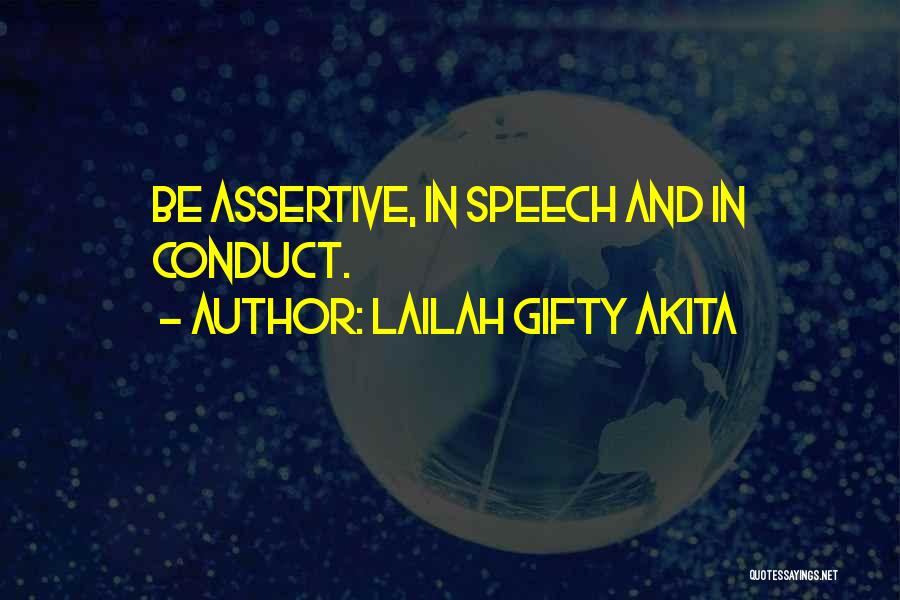Self Conduct Quotes & Sayings
Enjoy reading and share 76 famous quotes about Self Conduct with everyone.
Top Self Conduct Quotes
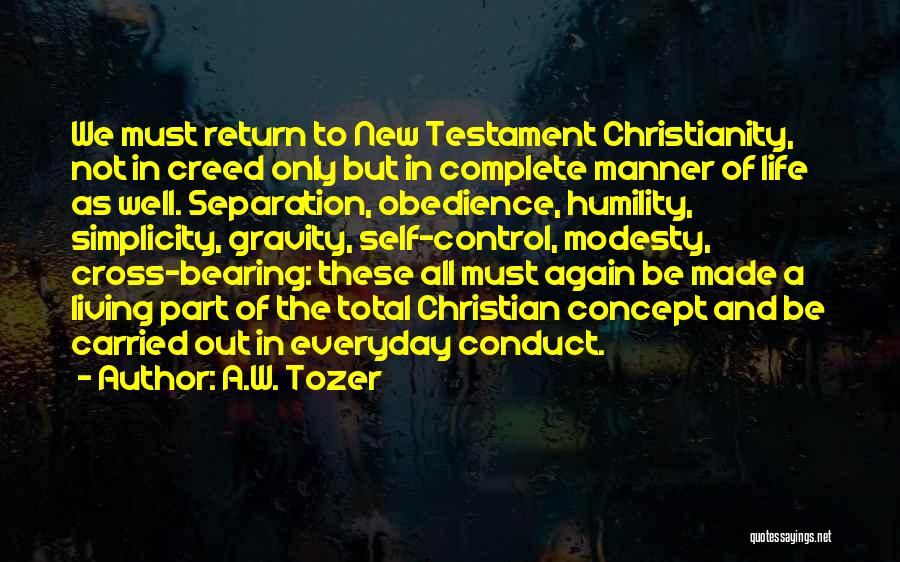
We must return to New Testament Christianity, not in creed only but in complete manner of life as well. Separation, obedience, humility, simplicity, gravity, self-control, modesty, cross-bearing: these all must again be made a living part of the total Christian concept and be carried out in everyday conduct. — A.W. Tozer
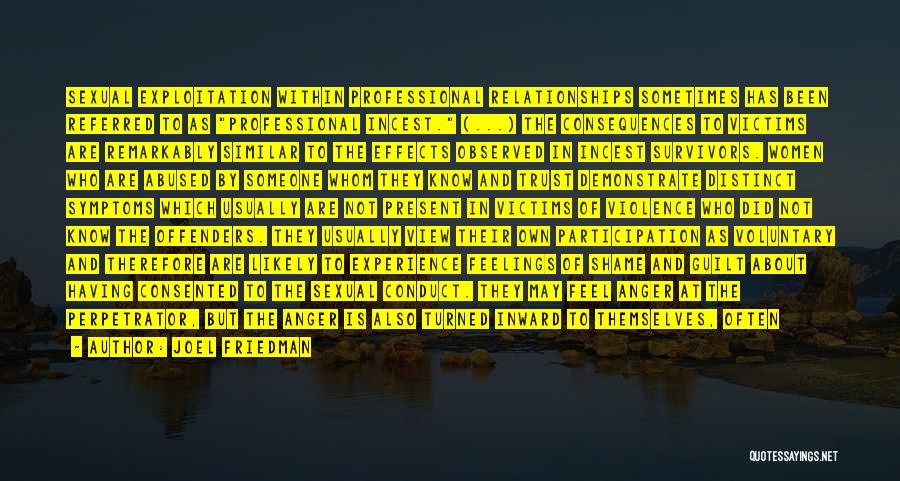
Sexual exploitation within professional relationships sometimes has been referred to as "professional incest." (...) the consequences to victims are remarkably similar to the effects observed in incest survivors. Women who are abused by someone whom they know and trust demonstrate distinct symptoms which usually are not present in victims of violence who did not know the offenders. They usually view their own participation as voluntary and therefore are likely to experience feelings of shame and guilt about having consented to the sexual conduct. They may feel anger at the perpetrator, but the anger is also turned inward to themselves, often leading to self-doubt and depression. As a result, they frequently demonstrate severely lowered self-esteem, social isolation, and sometimes self-destructive behavior, including suicide. — Joel Friedman
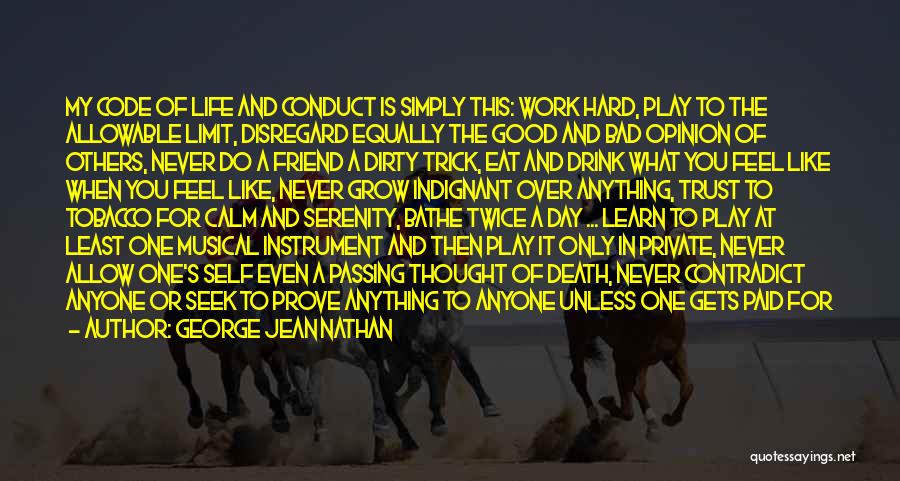
My code of life and conduct is simply this: work hard, play to the allowable limit, disregard equally the good and bad opinion of others, never do a friend a dirty trick, eat and drink what you feel like when you feel like, never grow indignant over anything, trust to tobacco for calm and serenity, bathe twice a day ... learn to play at least one musical instrument and then play it only in private, never allow one's self even a passing thought of death, never contradict anyone or seek to prove anything to anyone unless one gets paid for it in cold, hard coin, live the moment to the utmost of its possibilities, treat one's enemies with polite inconsideration, avoid persons who are chronically in need, and be satisfied with life always but never with one's self. — George Jean Nathan
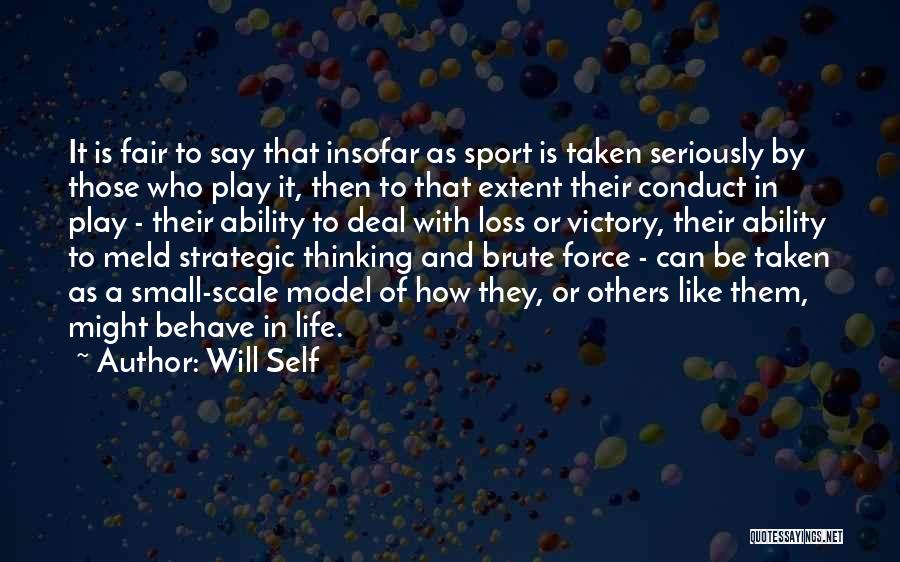
It is fair to say that insofar as sport is taken seriously by those who play it, then to that extent their conduct in play - their ability to deal with loss or victory, their ability to meld strategic thinking and brute force - can be taken as a small-scale model of how they, or others like them, might behave in life. — Will Self

Not only does inspiration from the Lord compensate for want of facts; it also induces men by self-discipline, to conform in their personal conduct and in their dealings one with another to the highest standards they know. In other words, it gives men the capacity which distinguishes wisdom from knowledge. — Marion G. Romney

a man without birth, without courage, without conduct. For my part, I declare, sir, it shall never be said that I made such a man my master. — Sarah Vowell
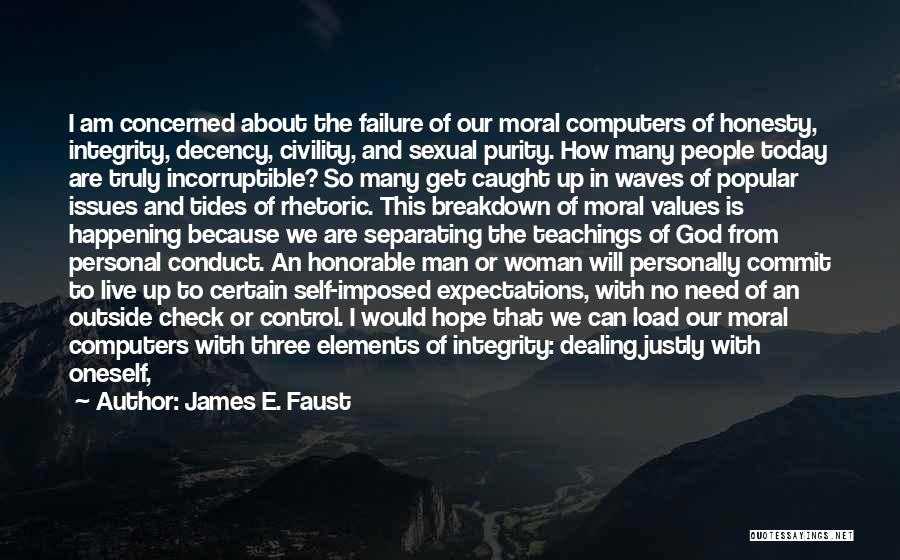
I am concerned about the failure of our moral computers of honesty, integrity, decency, civility, and sexual purity. How many people today are truly incorruptible? So many get caught up in waves of popular issues and tides of rhetoric. This breakdown of moral values is happening because we are separating the teachings of God from personal conduct. An honorable man or woman will personally commit to live up to certain self-imposed expectations, with no need of an outside check or control. I would hope that we can load our moral computers with three elements of integrity: dealing justly with oneself, dealing justly with others, and recognizing the law of the harvest. — James E. Faust
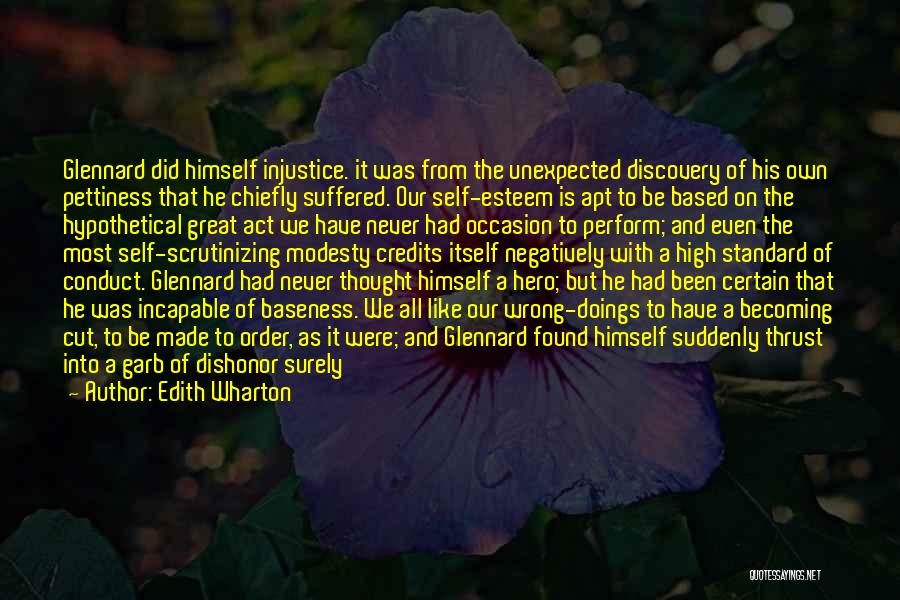
Glennard did himself injustice. it was from the unexpected discovery of his own pettiness that he chiefly suffered. Our self-esteem is apt to be based on the hypothetical great act we have never had occasion to perform; and even the most self-scrutinizing modesty credits itself negatively with a high standard of conduct. Glennard had never thought himself a hero; but he had been certain that he was incapable of baseness. We all like our wrong-doings to have a becoming cut, to be made to order, as it were; and Glennard found himself suddenly thrust into a garb of dishonor surely meant for a meaner figure. — Edith Wharton

Her (Jane Austen) moral message is infused with ideological insistence on the merits of good conduct, good manners, sound reason, and marriage as an admirable social institution. She never scorns love, but balances it often . . . with a firm advocacy of . . . the qualities of self-knowledge, self-discipline, and practicality. — Andrew Sanders
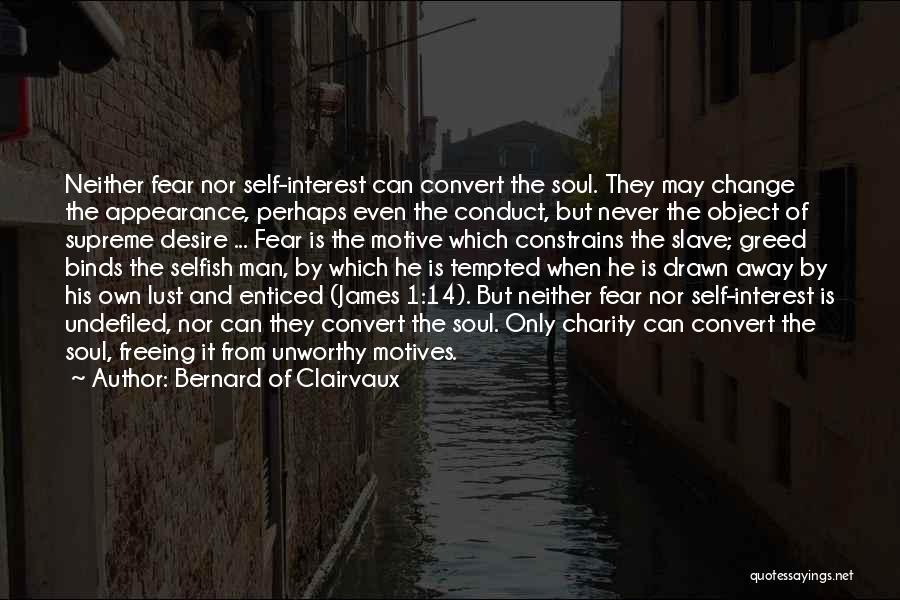
Neither fear nor self-interest can convert the soul. They may change the appearance, perhaps even the conduct, but never the object of supreme desire ... Fear is the motive which constrains the slave; greed binds the selfish man, by which he is tempted when he is drawn away by his own lust and enticed (James 1:14). But neither fear nor self-interest is undefiled, nor can they convert the soul. Only charity can convert the soul, freeing it from unworthy motives. — Bernard Of Clairvaux
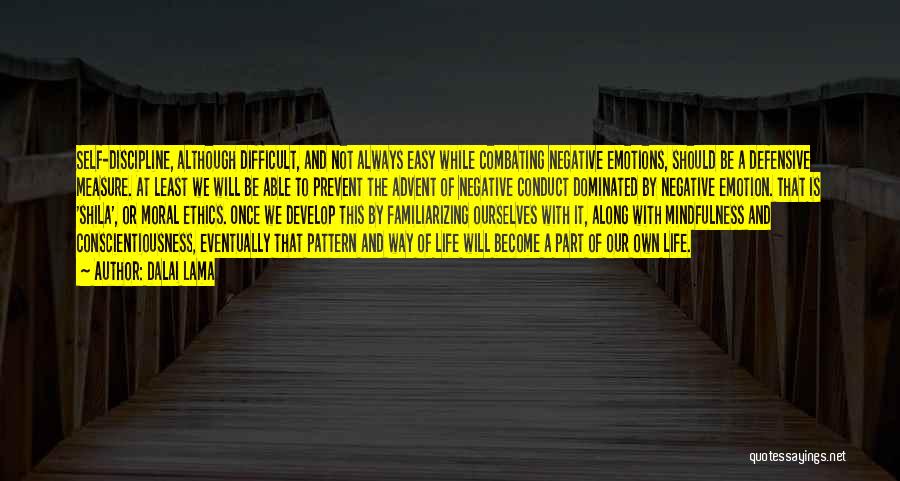
Self-discipline, although difficult, and not always easy while combating
negative emotions, should be a defensive measure. At least we will be able to prevent the advent of negative conduct dominated by negative emotion. That is 'shila', or moral ethics. Once we develop this by familiarizing ourselves with it, along with mindfulness and conscientiousness, eventually that pattern and way of life will become a part of our own life. — Dalai Lama
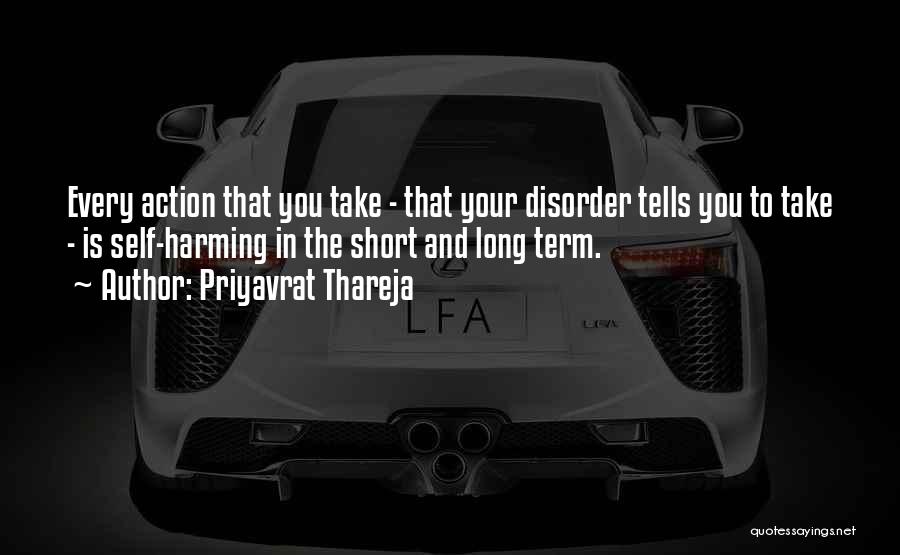
Every action that you take - that your disorder tells you to take - is self-harming in the short and long term. — Priyavrat Thareja
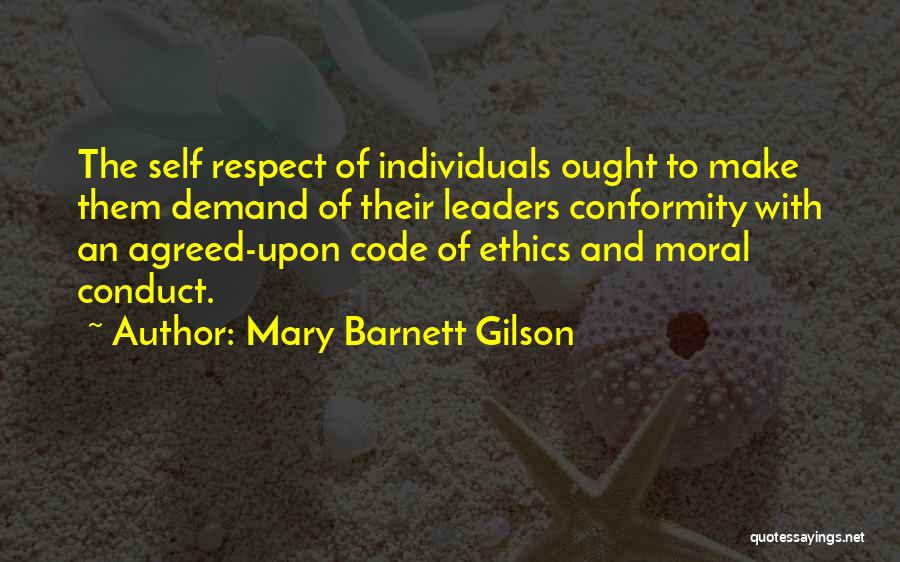
The self respect of individuals ought to make them demand of their leaders conformity with an agreed-upon code of ethics and moral conduct. — Mary Barnett Gilson

And yet, something tied them together, strong than any of that, something with the power to conduct her blood and breath like a symphony, so that anything she did to fight against it felt like discord, like disharmony with her self. — Laini Taylor
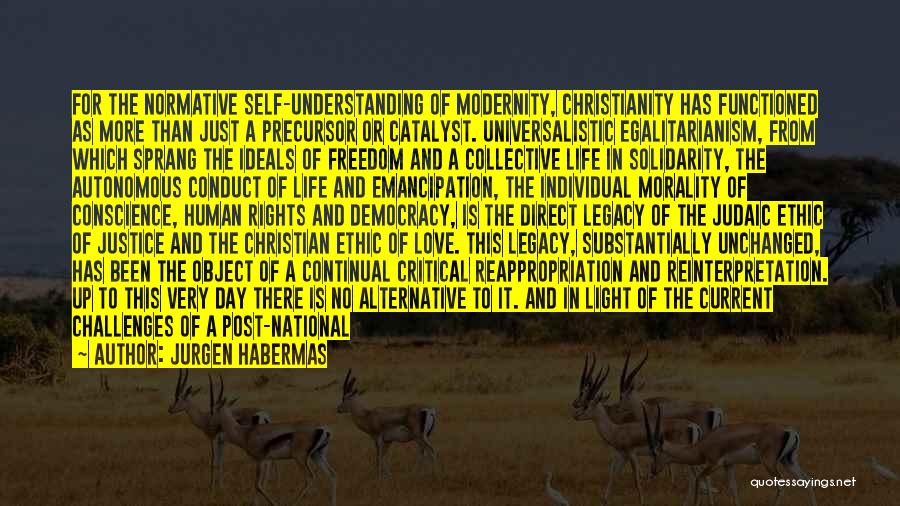
For the normative self-understanding of modernity, Christianity has functioned as more than just a precursor or catalyst. Universalistic egalitarianism, from which sprang the ideals of freedom and a collective life in solidarity, the autonomous conduct of life and emancipation, the individual morality of conscience, human rights and democracy, is the direct legacy of the Judaic ethic of justice and the Christian ethic of love. This legacy, substantially unchanged, has been the object of a continual critical reappropriation and reinterpretation. Up to this very day there is no alternative to it. And in light of the current challenges of a post-national constellation, we must draw sustenance now, as in the past, from this substance. Everything else is idle postmodern talk. — Jurgen Habermas
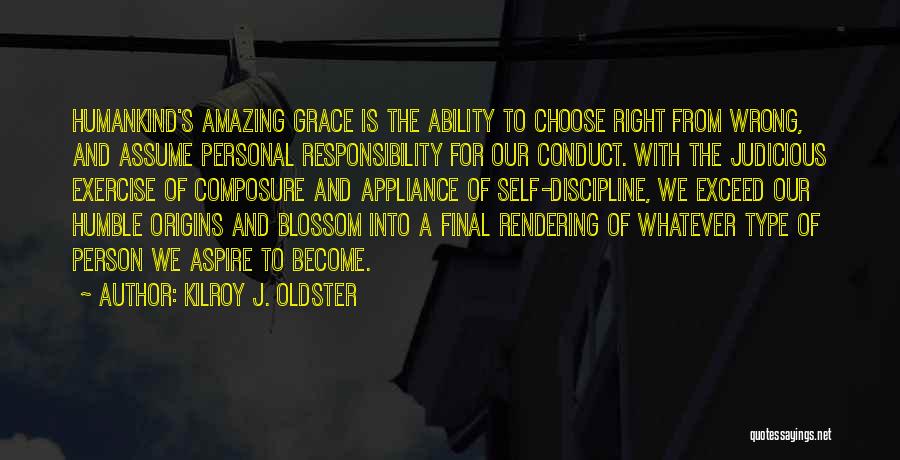
Humankind's amazing grace is the ability to choose right from wrong, and assume personal responsibility for our conduct. With the judicious exercise of composure and appliance of self-discipline, we exceed our humble origins and blossom into a final rendering of whatever type of person we aspire to become. — Kilroy J. Oldster
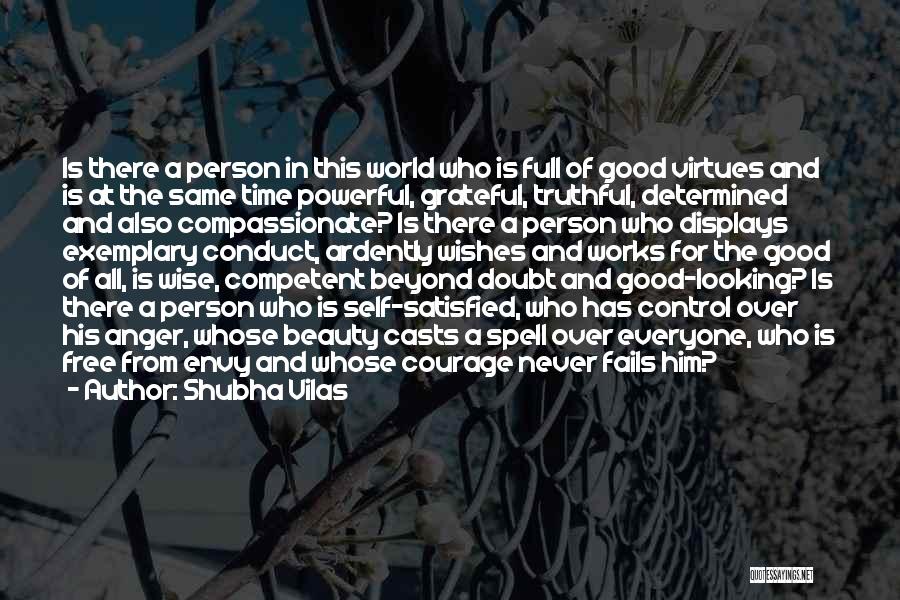
Is there a person in this world who is full of good virtues and is at the same time powerful, grateful, truthful, determined and also compassionate? Is there a person who displays exemplary conduct, ardently wishes and works for the good of all, is wise, competent beyond doubt and good-looking? Is there a person who is self-satisfied, who has control over his anger, whose beauty casts a spell over everyone, who is free from envy and whose courage never fails him? — Shubha Vilas
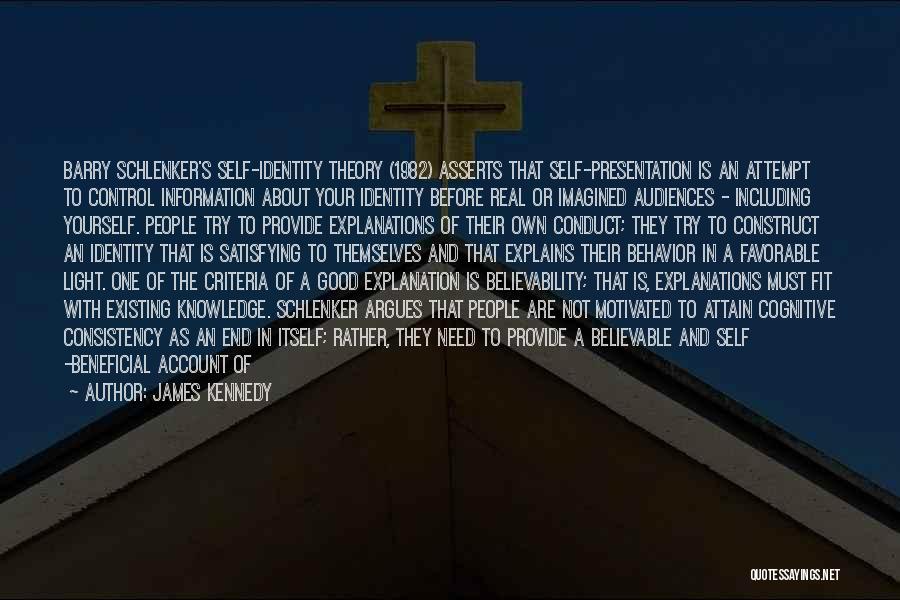
Barry Schlenker's self-identity theory (1982) asserts that self-presentation is an attempt to control information about your identity before real or imagined audiences - including yourself. People try to provide explanations of their own conduct; they try to construct an identity that is satisfying to themselves and that explains their behavior in a favorable light. One of the criteria of a good explanation is believability; that is, explanations must fit with existing knowledge. Schlenker argues that people are not motivated to attain cognitive consistency as an end in itself; rather, they need to provide a believable and self -beneficial account of their conduct, and consistency is a by-product of that. The need to provide explanations for your conduct results in the construction of an internally consistent view of reality. — James Kennedy
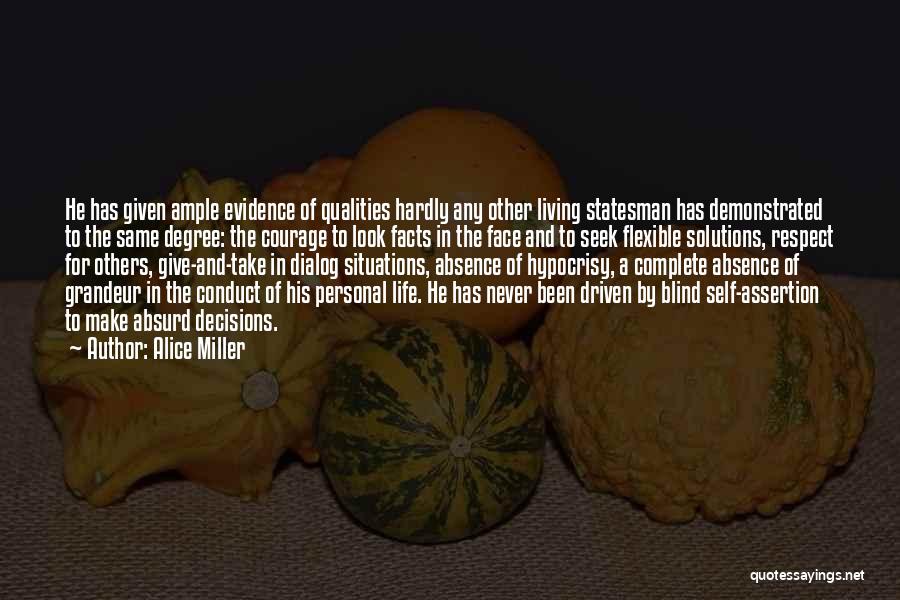
He has given ample evidence of qualities hardly any other living statesman has demonstrated to the same degree: the courage to look facts in the face and to seek flexible solutions, respect for others, give-and-take in dialog situations, absence of hypocrisy, a complete absence of grandeur in the conduct of his personal life. He has never been driven by blind self-assertion to make absurd decisions. — Alice Miller
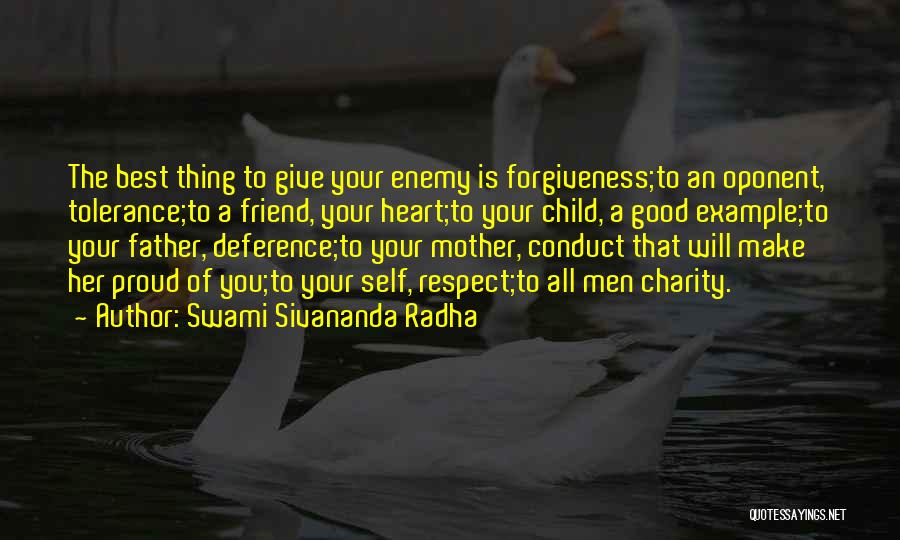
The best thing to give
your enemy is forgiveness;
to an oponent, tolerance;
to a friend, your heart;
to your child, a good example;
to your father, deference;
to your mother, conduct that will make her proud of you;
to your self, respect;
to all men charity. — Swami Sivananda Radha
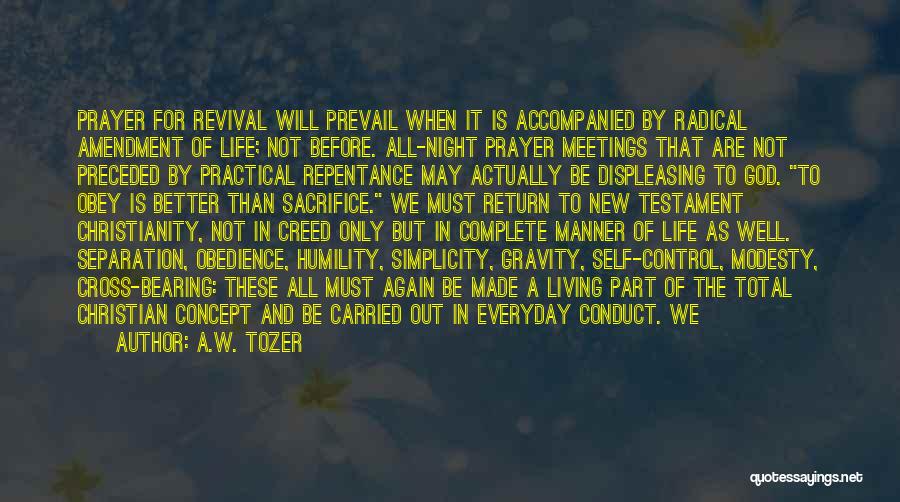
Prayer for revival will prevail when it is accompanied by radical amendment of life; not before. All-night prayer meetings that are not preceded by practical repentance may actually be displeasing to God. "To obey is better than sacrifice." We must return to New Testament Christianity, not in creed only but in complete manner of life as well. Separation, obedience, humility, simplicity, gravity, self-control, modesty, cross-bearing: these all must again be made a living part of the total Christian concept and be carried out in everyday conduct. We — A.W. Tozer
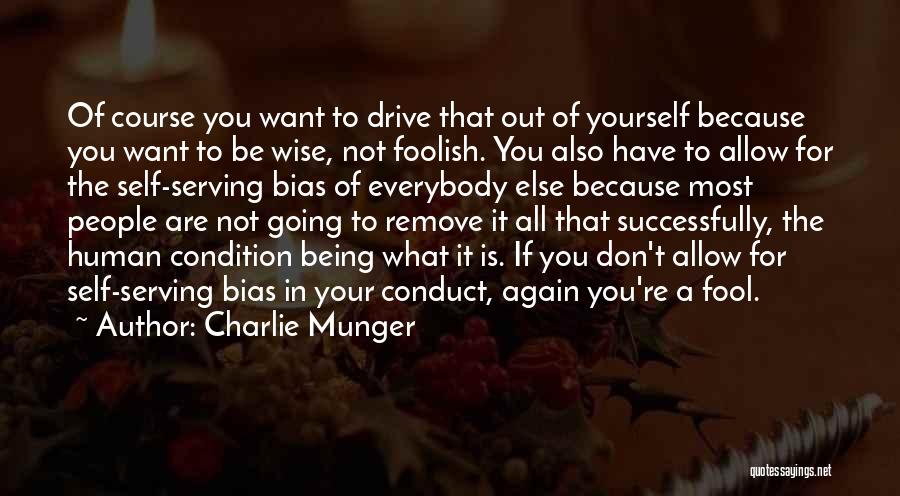
Of course you want to drive that out of yourself because you want to be wise, not foolish. You also have to allow for the self-serving bias of everybody else because most people are not going to remove it all that successfully, the human condition being what it is. If you don't allow for self-serving bias in your conduct, again you're a fool. — Charlie Munger
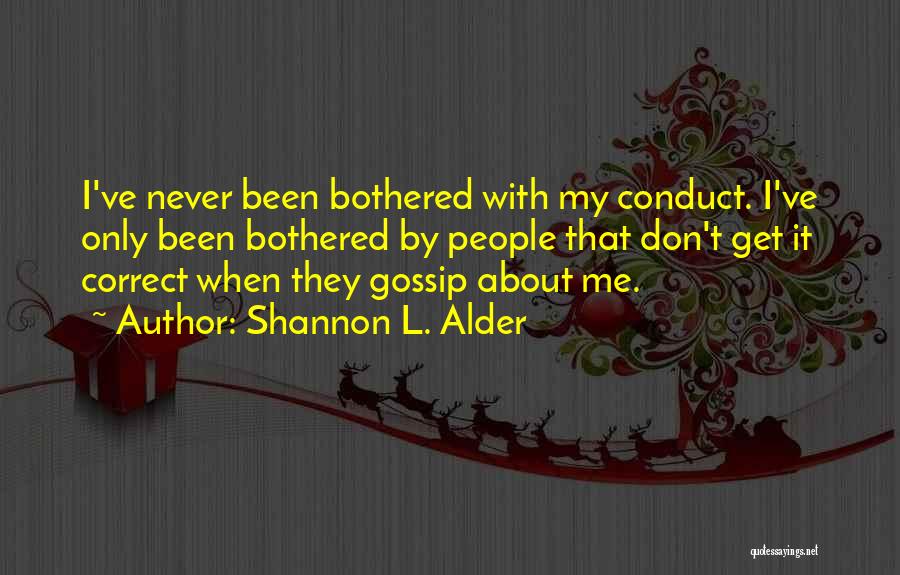
I've never been bothered with my conduct. I've only been bothered by people that don't get it correct when they gossip about me. — Shannon L. Alder
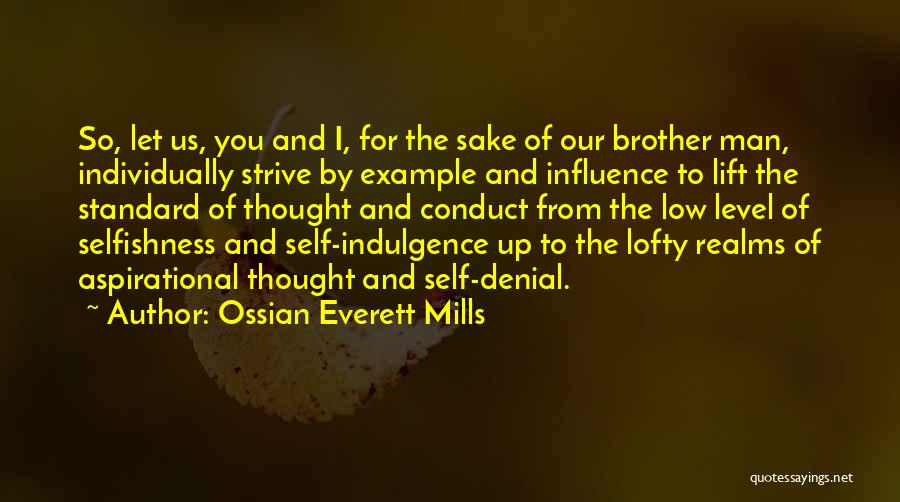
So, let us, you and I, for the sake of our brother man, individually strive by example and influence to lift the standard of thought and conduct from the low level of selfishness and self-indulgence up to the lofty realms of aspirational thought and self-denial. — Ossian Everett Mills
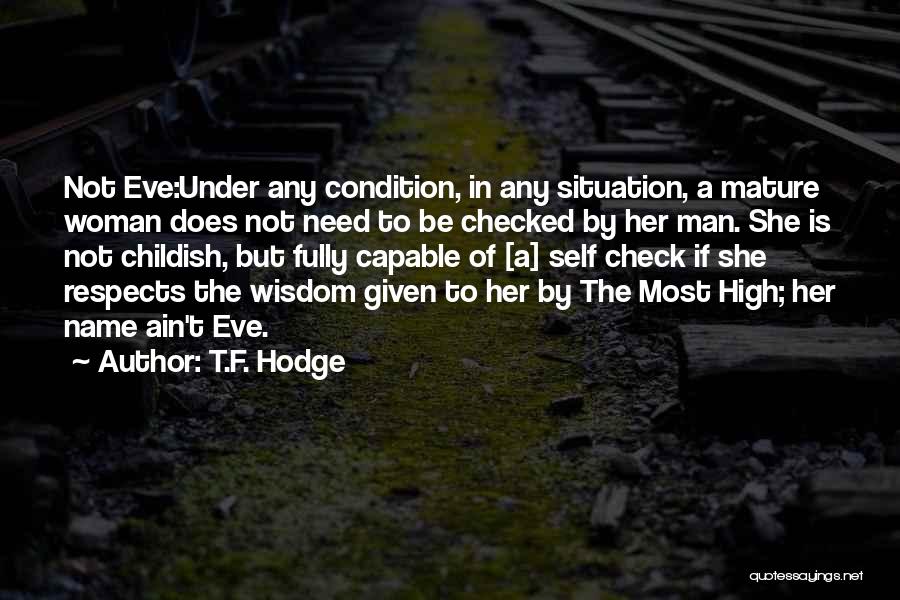
Not Eve:
Under any condition, in any situation, a mature woman does not need to be checked by her man. She is not childish, but fully capable of [a] self check if she respects the wisdom given to her by The Most High; her name ain't Eve. — T.F. Hodge
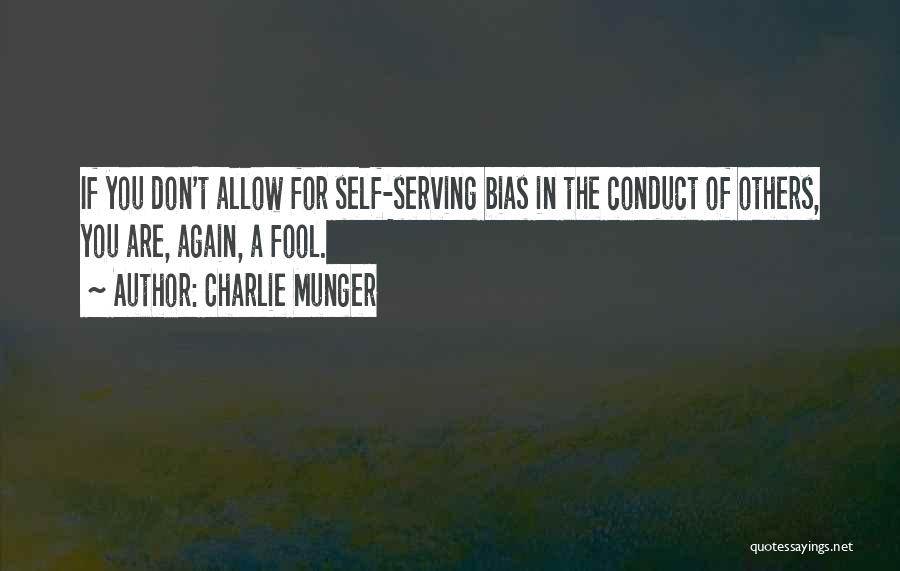
If you don't allow for self-serving bias in the conduct of others, you are, again, a fool. — Charlie Munger
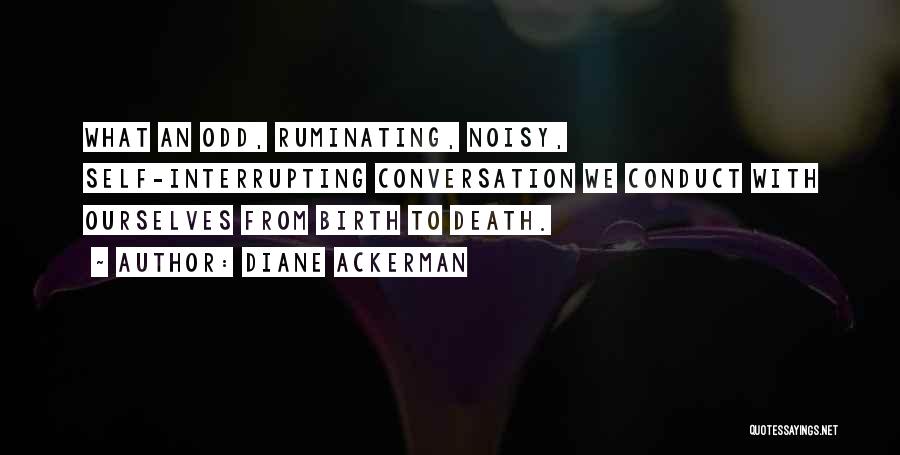
What an odd, ruminating, noisy, self-interrupting conversation we conduct with ourselves from birth to death. — Diane Ackerman
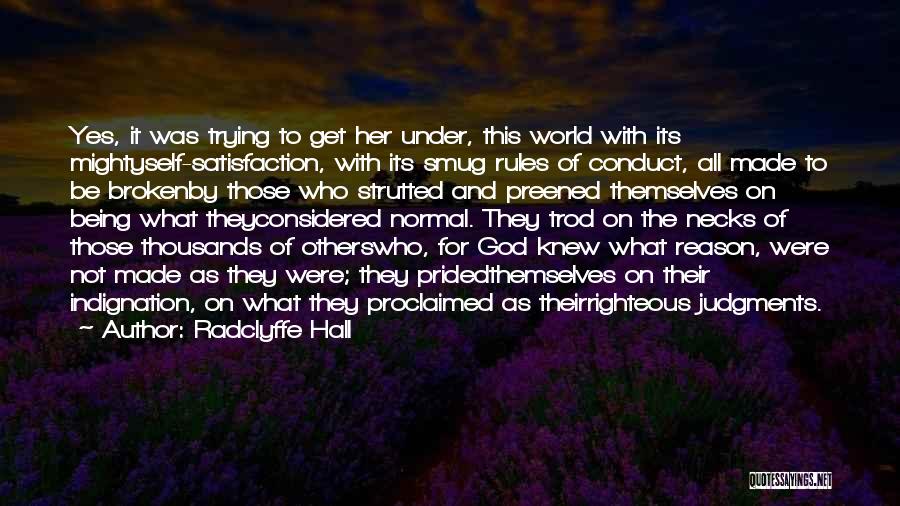
Yes, it was trying to get her under, this world with its mighty
self-satisfaction, with its smug rules of conduct, all made to be broken
by those who strutted and preened themselves on being what they
considered normal. They trod on the necks of those thousands of others
who, for God knew what reason, were not made as they were; they prided
themselves on their indignation, on what they proclaimed as their
righteous judgments. — Radclyffe Hall
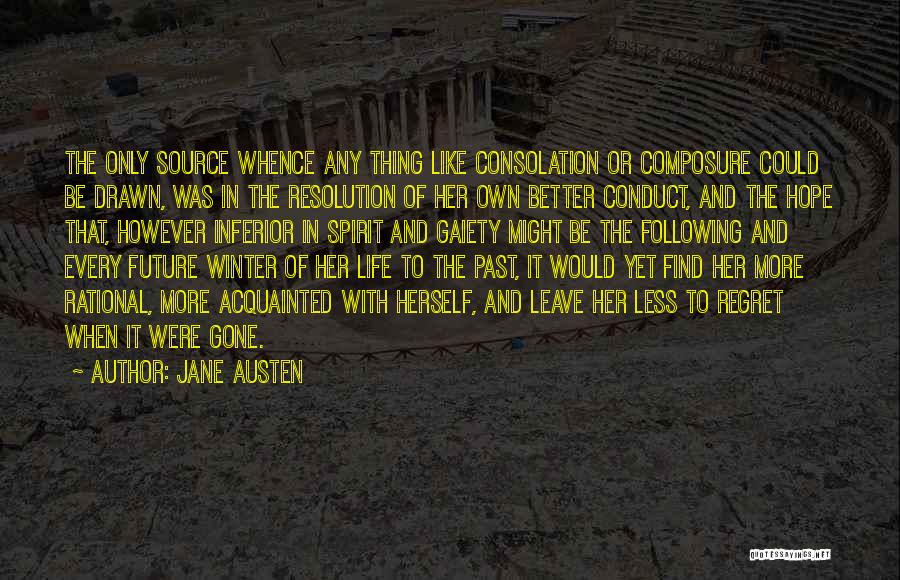
The only source whence any thing like consolation or composure could be drawn, was in the resolution of her own better conduct, and the hope that, however inferior in spirit and gaiety might be the following and every future winter of her life to the past, it would yet find her more rational, more acquainted with herself, and leave her less to regret when it were gone. — Jane Austen
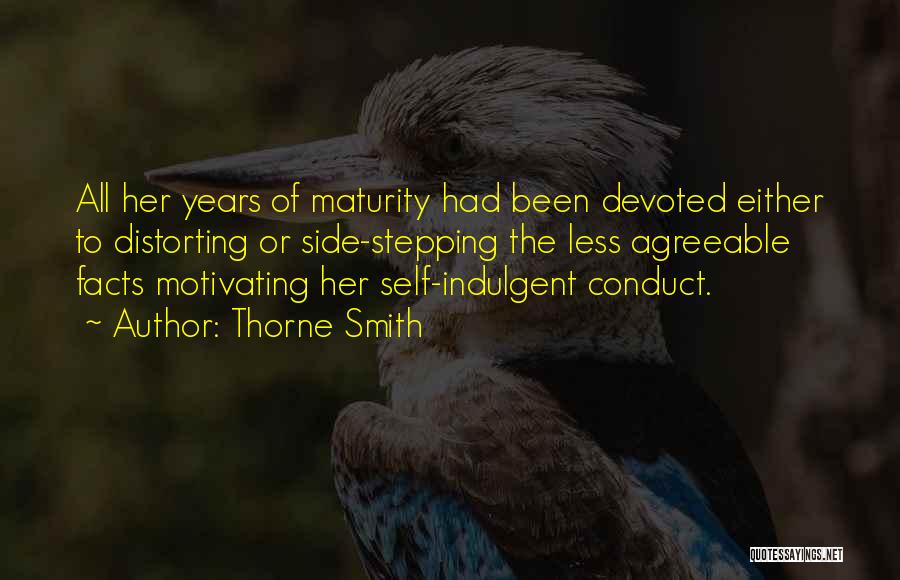
All her years of maturity had been devoted either to distorting or side-stepping the less agreeable facts motivating her self-indulgent conduct. — Thorne Smith

Bobby Kennedy's conduct toward Lyndon Johnson was childish and despicable. As the years went on, he displayed nasty, self-pitying, and messianic qualities that would have made him a dangerously authoritarian president. — Thomas Mallon
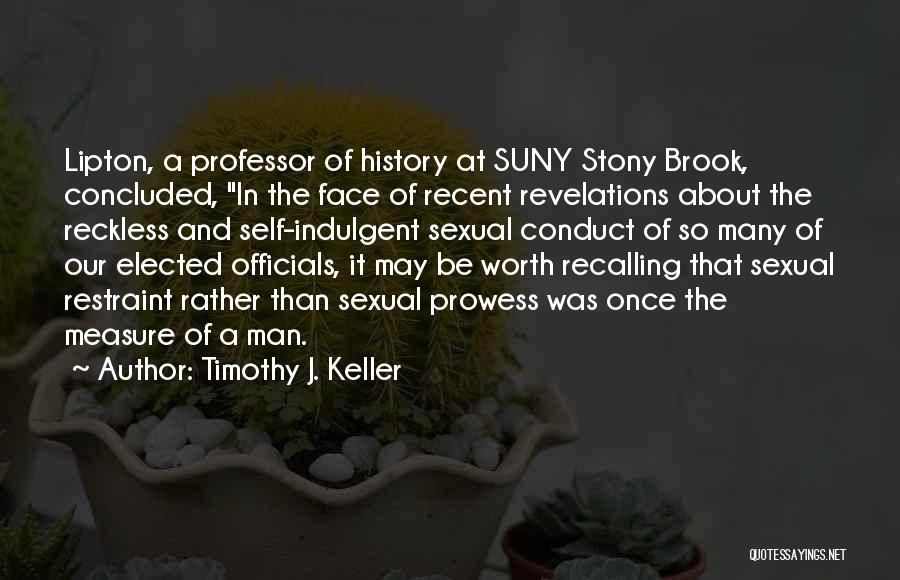
Lipton, a professor of history at SUNY Stony Brook, concluded, "In the face of recent revelations about the reckless and self-indulgent sexual conduct of so many of our elected officials, it may be worth recalling that sexual restraint rather than sexual prowess was once the measure of a man. — Timothy J. Keller
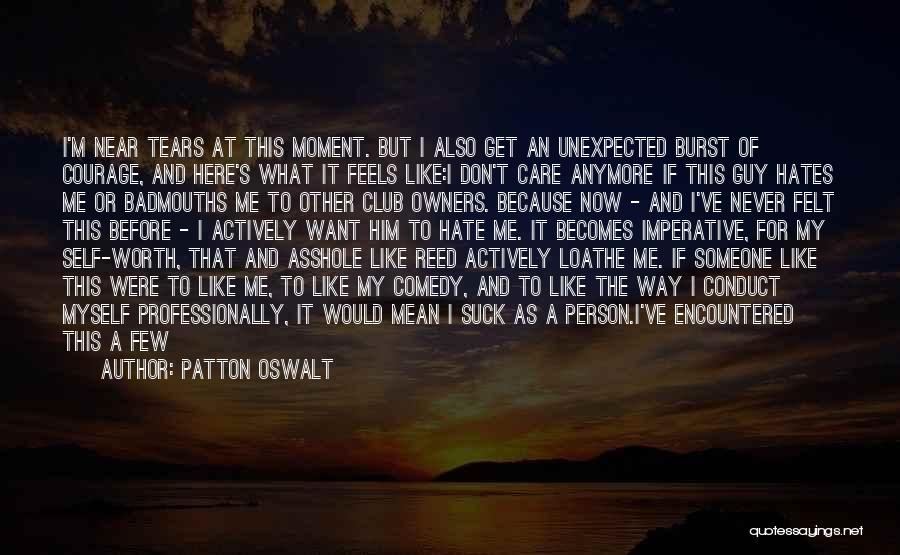
I'm near tears at this moment. But I also get an unexpected burst of courage, and here's what it feels like:
I don't care anymore if this guy hates me or badmouths me to other club owners. Because now - and I've never felt this before - I actively want him to hate me. It becomes imperative, for my self-worth, that and asshole like Reed actively loathe me. If someone like this were to like me, to like my comedy, and to like the way I conduct myself professionally, it would mean I suck as a person.
I've encountered this a few times since then. Not very often. But there are those rare occasions - and they're bracing, freeing sensations when they occur - when you absolutely crave someone's disapproval and disgust. You can see it actually helping your career, your social relations, and your life if it becomes known that this person thinks you're shit. — Patton Oswalt
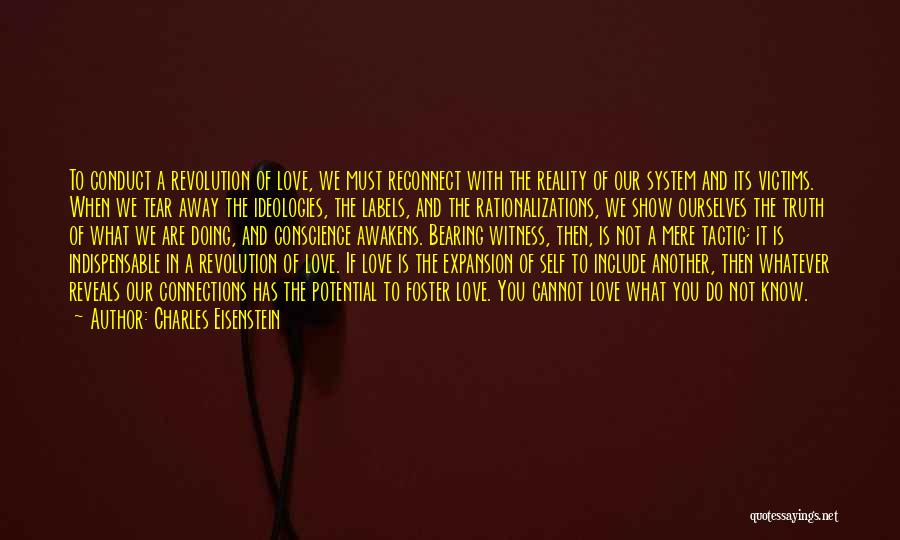
To conduct a revolution of love, we must reconnect with the reality of our system and its victims. When we tear away the ideologies, the labels, and the rationalizations, we show ourselves the truth of what we are doing, and conscience awakens. Bearing witness, then, is not a mere tactic; it is indispensable in a revolution of love. If love is the expansion of self to include another, then whatever reveals our connections has the potential to foster love. You cannot love what you do not know. — Charles Eisenstein
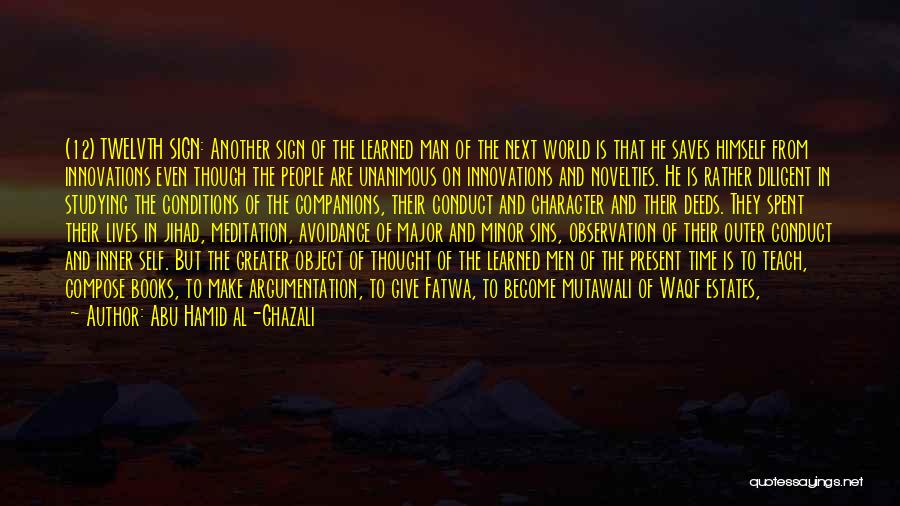
(12) TWELVTH SIGN: Another sign of the learned man of the next world is that he saves himself from innovations even though the people are unanimous on innovations and novelties. He is rather diligent in studying the conditions of the companions, their conduct and character and their deeds. They spent their lives in jihad, meditation, avoidance of major and minor sins, observation of their outer conduct and inner self. But the greater object of thought of the learned men of the present time is to teach, compose books, to make argumentation, to give Fatwa, to become mutawali of Waqf estates, enjoy the properties of orphans, frequent the rulers and enjoy their company. — Abu Hamid Al-Ghazali
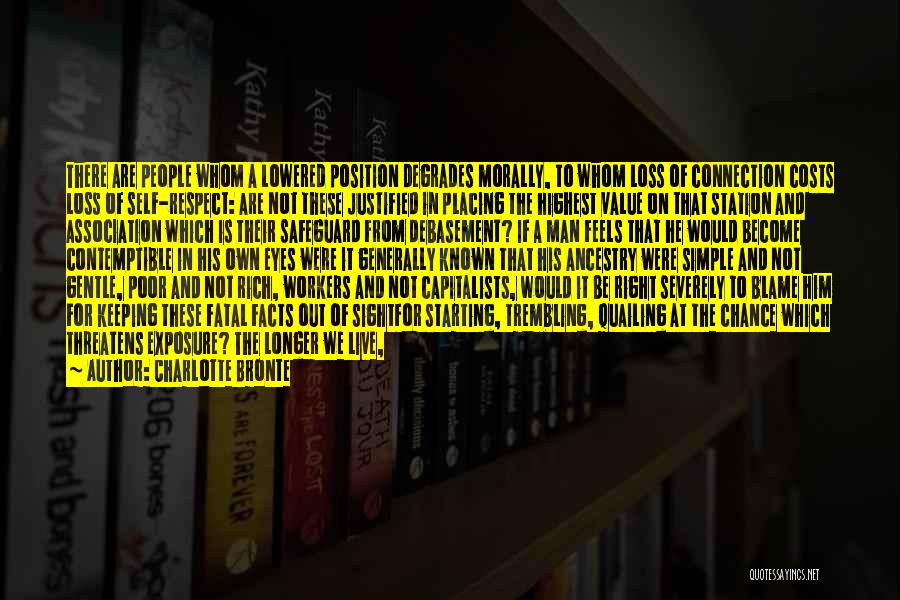
There are people whom a lowered position degrades morally, to whom loss of connection costs loss of self-respect: are not these justified in placing the highest value on that station and association which is their safeguard from debasement? If a man feels that he would become contemptible in his own eyes were it generally known that his ancestry were simple and not gentle, poor and not rich, workers and not capitalists, would it be right severely to blame him for keeping these fatal facts out of sight
for starting, trembling, quailing at the chance which threatens exposure? The longer we live, the more our experience widens; the less prone are we to judge our neighbor's conduct, to question the world's wisdom: wherever an accumulation of small defences is found, whether surrounding the prude's virtue or the man of the world's respectability, there, be sure, it is needed. — Charlotte Bronte

I do not condemn any personal choices for intimate relationships. Love is love. I detest only the violence and trauma that any self-centered conduct can cause to others. — Akiane Kramarik
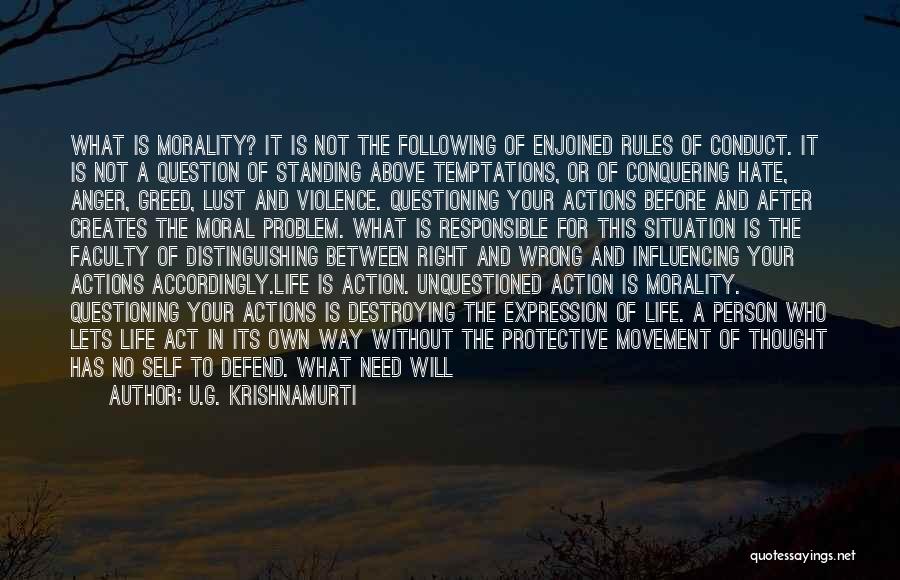
What is morality? It is not the following of enjoined rules of conduct. It is not a question of standing above temptations, or of conquering hate, anger, greed, lust and violence.
Questioning your actions before and after creates the moral problem. What is responsible for this situation is the faculty of distinguishing between right and wrong and influencing your actions accordingly.Life is action. Unquestioned action is morality. Questioning your actions is destroying the expression of life. A person who lets life act in its own way without the protective movement of thought has no self to defend. What need will he have to lie or cheat or pretend or to commit any other act which his society considers immoral? — U.G. Krishnamurti
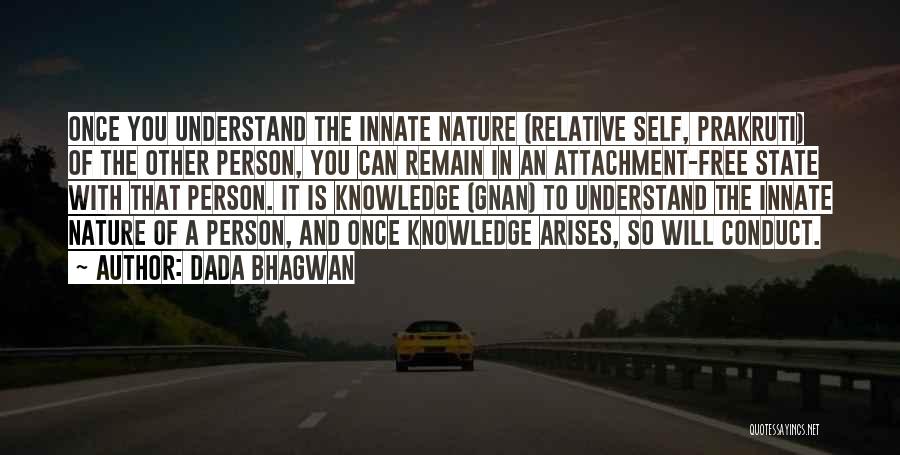
Once you understand the innate nature (relative self, prakruti) of the other person, you can remain in an attachment-free state with that person. It is Knowledge (Gnan) to understand the innate nature of a person, and once Knowledge arises, so will conduct. — Dada Bhagwan

He was interested in the human side of that struggle to express something which was so obscure in the man's mind that he was become morbid and querulous. Philip felt vaguely that he himself was himself in the same case, but with him it was the conduct of his life as a whole that perplexed him. That was his means of self-expression, and what he must do with it was not clear. — W. Somerset Maugham
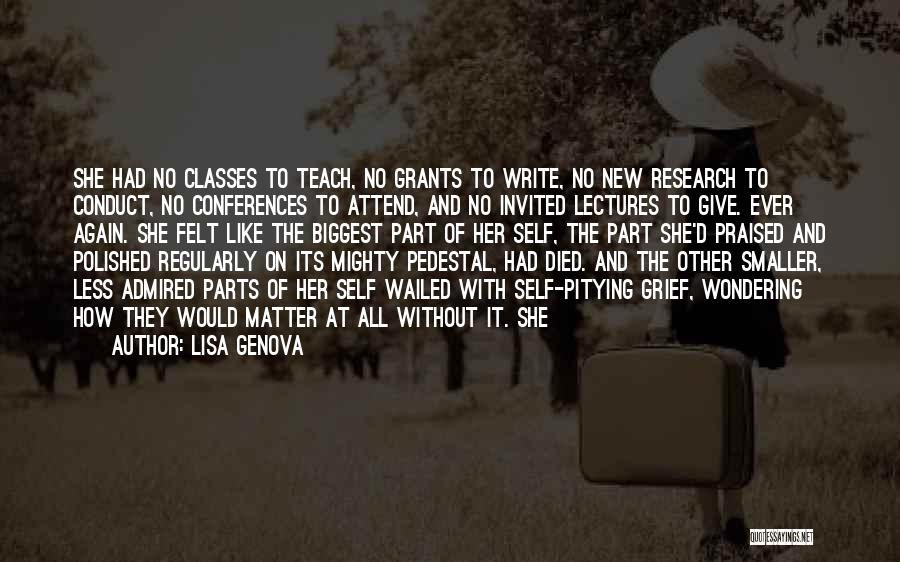
SHE HAD NO CLASSES to teach, no grants to write, no new research to conduct, no conferences to attend, and no invited lectures to give. Ever again. She felt like the biggest part of her self, the part she'd praised and polished regularly on its mighty pedestal, had died. And the other smaller, less admired parts of her self wailed with self-pitying grief, wondering how they would matter at all without it. She — Lisa Genova
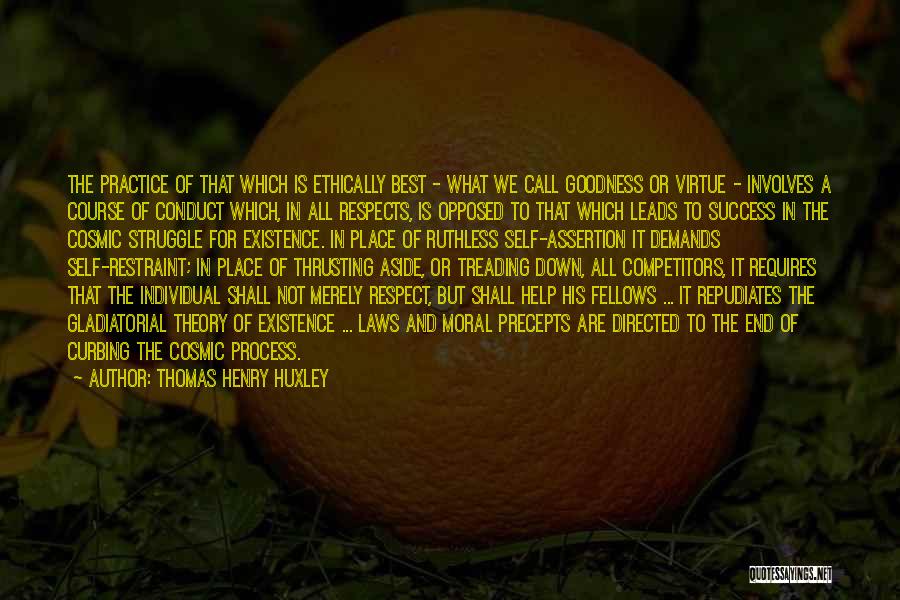
The practice of that which is ethically best - what we call goodness or virtue - involves a course of conduct which, in all respects, is opposed to that which leads to success in the cosmic struggle for existence. In place of ruthless self-assertion it demands self-restraint; in place of thrusting aside, or treading down, all competitors, it requires that the individual shall not merely respect, but shall help his fellows ... It repudiates the gladiatorial theory of existence ... Laws and moral precepts are directed to the end of curbing the cosmic process. — Thomas Henry Huxley
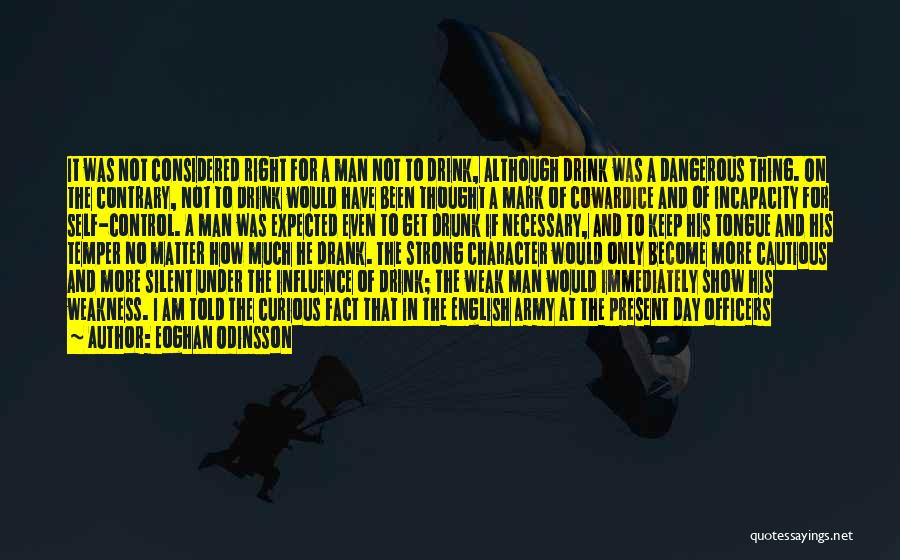
It was not considered right for a man not to drink, although drink was a dangerous thing. On the contrary, not to drink would have been thought a mark of cowardice and of incapacity for self-control. A man was expected even to get drunk if necessary, and to keep his tongue and his temper no matter how much he drank. The strong character would only become more cautious and more silent under the influence of drink; the weak man would immediately show his weakness. I am told the curious fact that in the English army at the present day officers are expected to act very much after the teaching of the old Norse poet; a man is expected to be able on occasion to drink a considerable amount of wine or spirits without showing the effects of it, either in his conduct or in his speech. "Drink thy share of mead; speak fair or not at all" - that was the old text, and a very sensible one in its way. — Eoghan Odinsson
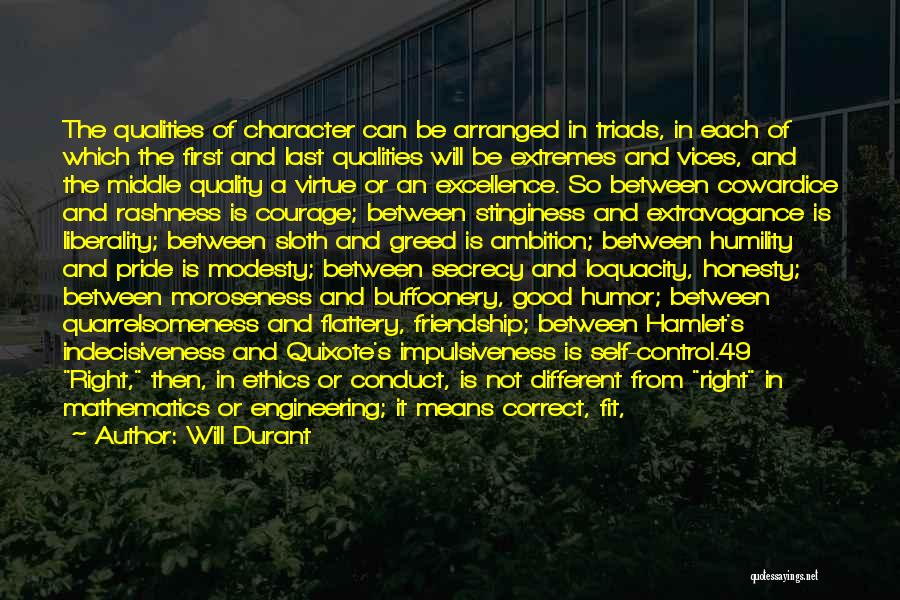
The qualities of character can be arranged in triads, in each of which the first and last qualities will be extremes and vices, and the middle quality a virtue or an excellence. So between cowardice and rashness is courage; between stinginess and extravagance is liberality; between sloth and greed is ambition; between humility and pride is modesty; between secrecy and loquacity, honesty; between moroseness and buffoonery, good humor; between quarrelsomeness and flattery, friendship; between Hamlet's indecisiveness and Quixote's impulsiveness is self-control.49 "Right," then, in ethics or conduct, is not different from "right" in mathematics or engineering; it means correct, fit, what works best to the best result. The — Will Durant
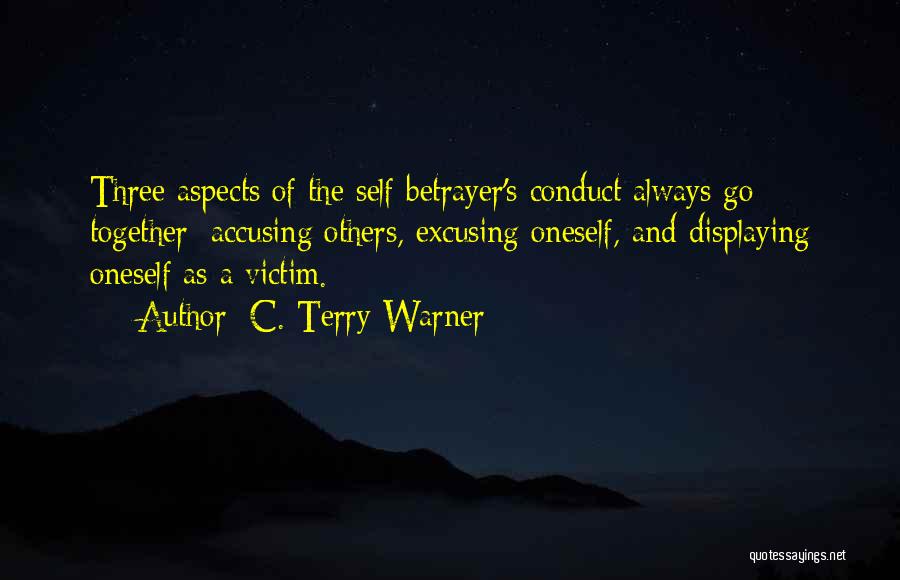
Three aspects of the self betrayer's conduct always go together: accusing others, excusing oneself, and displaying oneself as a victim. — C. Terry Warner
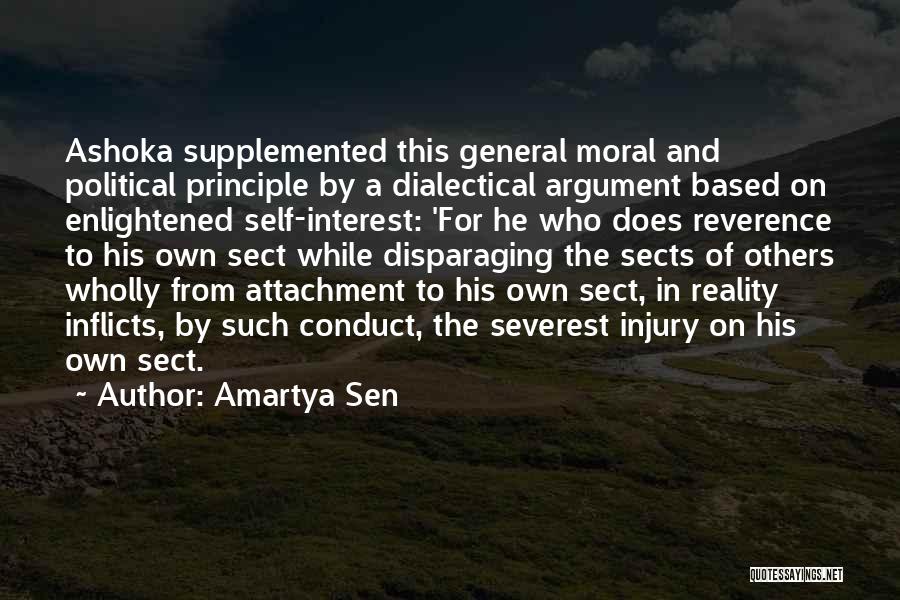
Ashoka supplemented this general moral and political principle by a dialectical argument based on enlightened self-interest: 'For he who does reverence to his own sect while disparaging the sects of others wholly from attachment to his own sect, in reality inflicts, by such conduct, the severest injury on his own sect. — Amartya Sen

As soon as you trust yourself, you will know how to live. — Johann Wolfgang Von Goethe
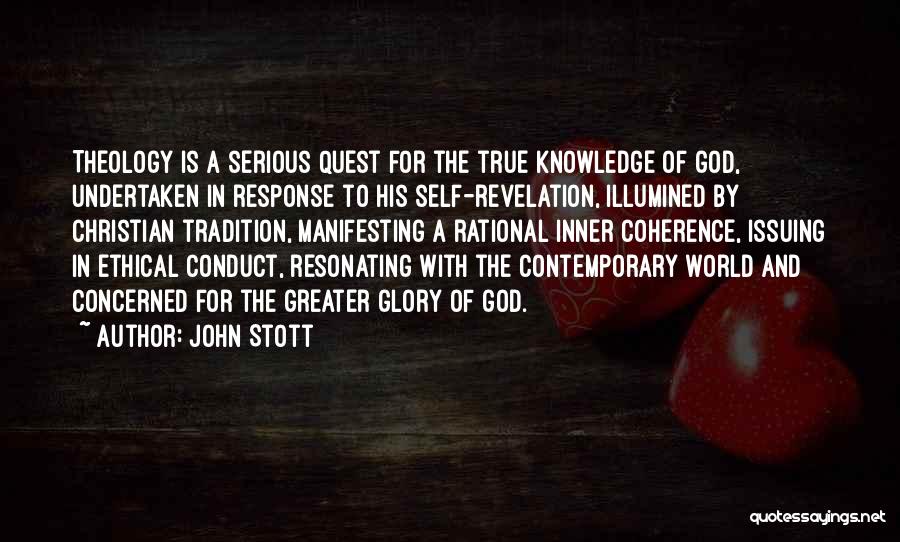
Theology is a serious quest for the true knowledge of God, undertaken in response to His self-revelation, illumined by Christian tradition, manifesting a rational inner coherence, issuing in ethical conduct, resonating with the contemporary world and concerned for the greater glory of God. — John Stott

The next Post brought a reply from the starets, who wrote to him that the cause of all his trouble lay in his pride. His Wrathful Outburst, the starets explained, had come about because it was not for God that he had humbled himself, rejecting honours and advancement in the church - not for God, but to satisfy his own pride, to be able to tell himself how virtuous he was, seeking nothing for self. That was why he had not been able to endure the Superior's conduct. Because he felt that he had given up everything for God, and now he was being put on display, like some strange beast.
If it were for God you had given up advancement, you would have let it pass.
worldly pride is still alive in you. — Leo Tolstoy
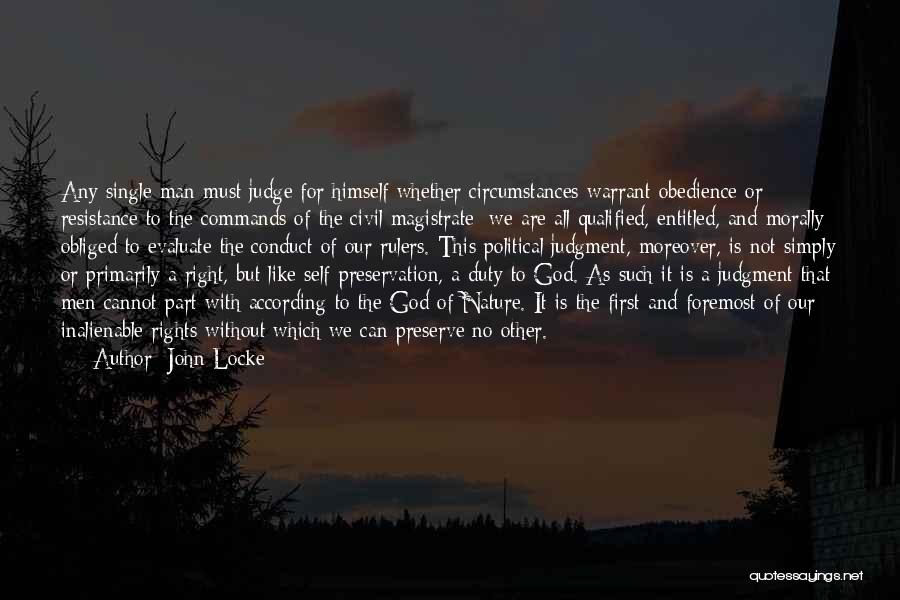
Any single man must judge for himself whether circumstances warrant obedience or resistance to the commands of the civil magistrate; we are all qualified, entitled, and morally obliged to evaluate the conduct of our rulers. This political judgment, moreover, is not simply or primarily a right, but like self-preservation, a duty to God. As such it is a judgment that men cannot part with according to the God of Nature. It is the first and foremost of our inalienable rights without which we can preserve no other. — John Locke
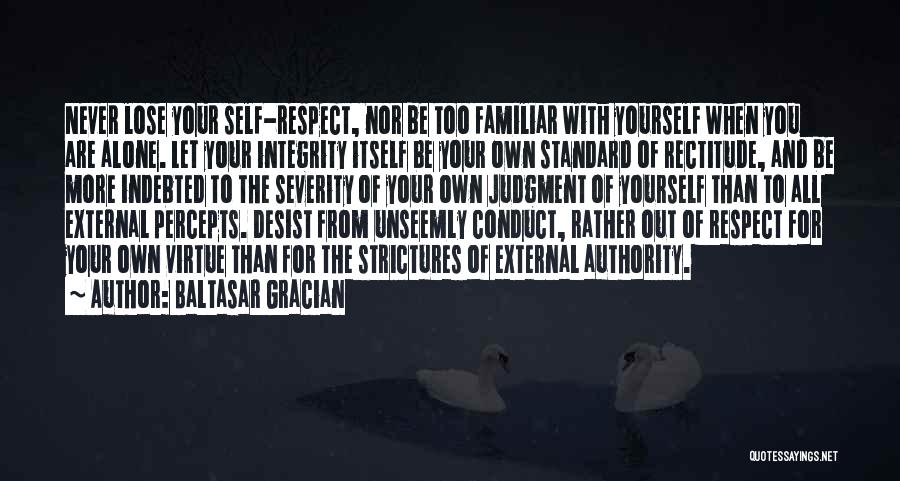
Never lose your self-respect, nor be too familiar with yourself when you are alone. Let your integrity itself be your own standard of rectitude, and be more indebted to the severity of your own judgment of yourself than to all external percepts. Desist from unseemly conduct, rather out of respect for your own virtue than for the strictures of external authority. — Baltasar Gracian
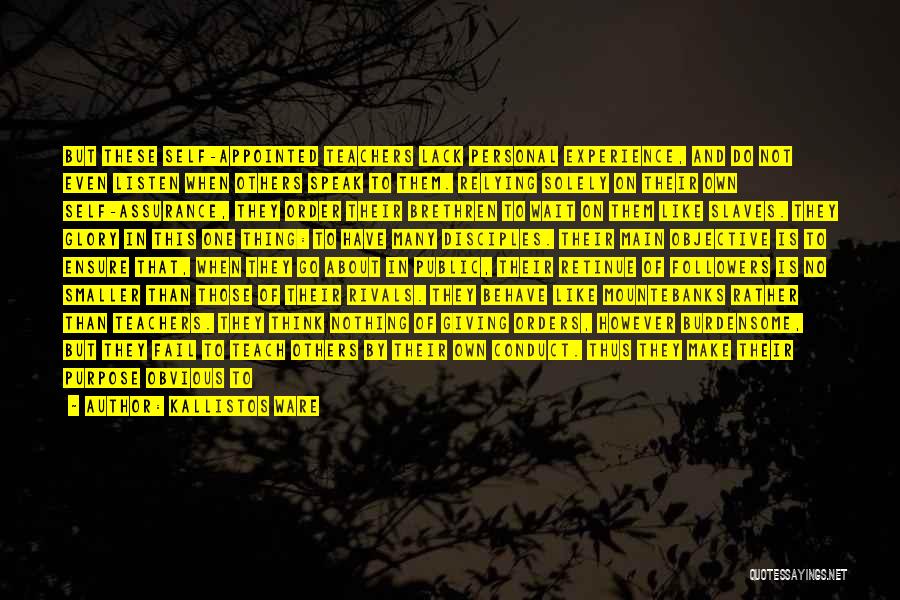
But these self-appointed teachers lack personal experience, and do not even listen when others speak to them. Relying solely on their own self-assurance, they order their brethren to wait on them like slaves. They glory in this one thing: to have many disciples. Their main objective is to ensure that, when they go about in public, their retinue of followers is no smaller than those of their rivals. They behave like mountebanks rather than teachers. They think nothing of giving orders, however burdensome, but they fail to teach others by their own conduct. Thus they make their purpose obvious to all: they have insinuated themselves into a position of leadership, not for the benefit of their disciples, but to promote their own pleasure. — Kallistos Ware

If someone like this were to like me, to like my comedy, and to like the way I conduct myself professionally, it would mean that I suck as a person. — Patton Oswalt
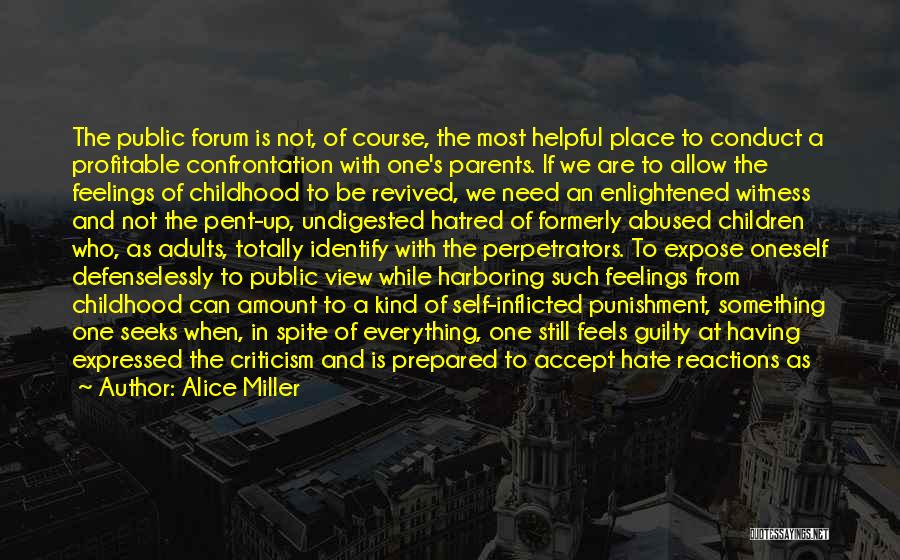
The public forum is not, of course, the most helpful place to conduct a profitable confrontation with one's parents. If we are to allow the feelings of childhood to be revived, we need an enlightened witness and not the pent-up, undigested hatred of formerly abused children who, as adults, totally identify with the perpetrators. To expose oneself defenselessly to public view while harboring such feelings from childhood can amount to a kind of self-inflicted punishment, something one seeks when, in spite of everything, one still feels guilty at having expressed the criticism and is prepared to accept hate reactions as a well deserved punishment. — Alice Miller
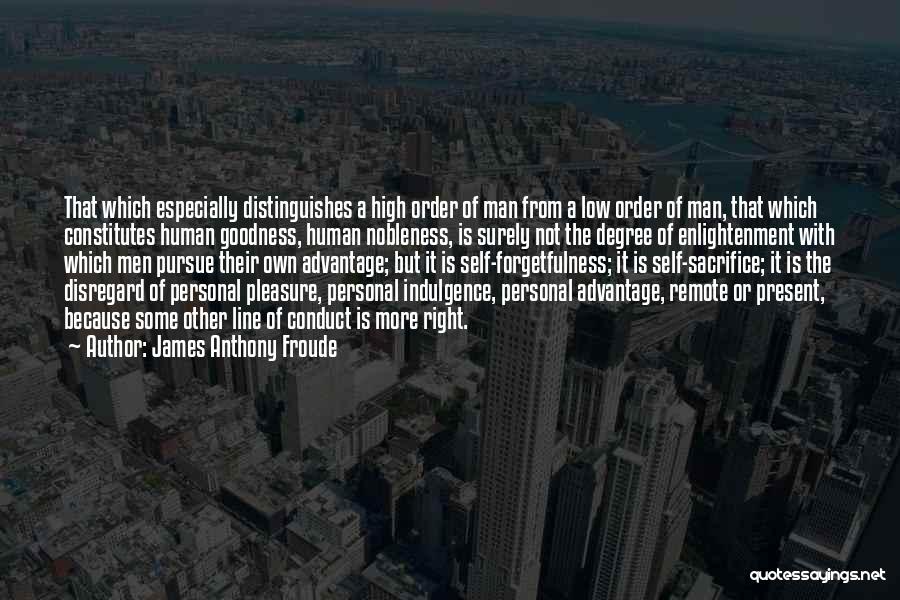
That which especially distinguishes a high order of man from a low order of man, that which constitutes human goodness, human nobleness, is surely not the degree of enlightenment with which men pursue their own advantage; but it is self-forgetfulness; it is self-sacrifice; it is the disregard of personal pleasure, personal indulgence, personal advantage, remote or present, because some other line of conduct is more right. — James Anthony Froude

His wise parent disapproved of this uncatly conduct; it indicated a certain lack of character, and no good would come of it. By her own example she tried to guide him. When dinner was served she gave the plate a haughty sniff and walked away, no matter how tempting the dish. That was the way it was done by any self-respecting feline. In a minute or two she returned and condescended to dine, but never with open enthusiasm. — Lilian Jackson Braun
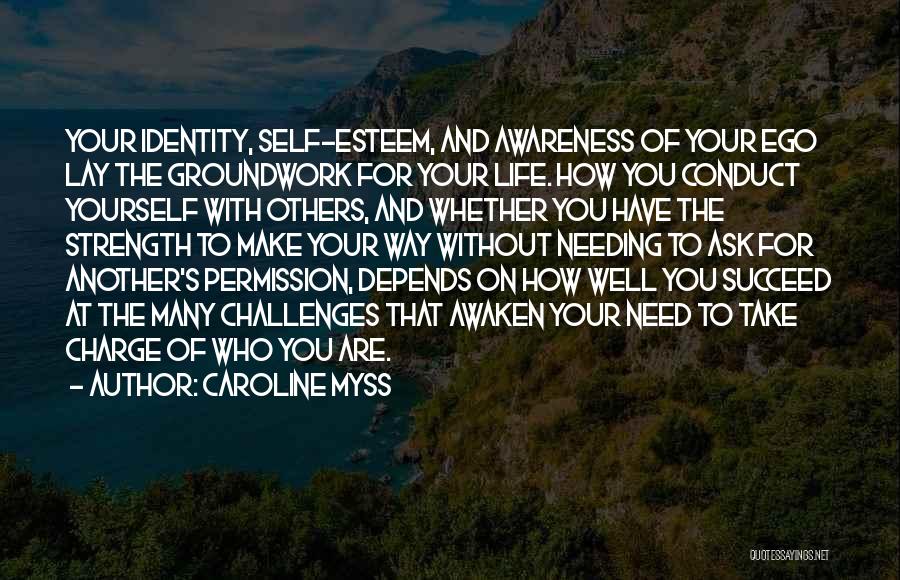
Your identity, self-esteem, and awareness of your ego lay the groundwork for your life. How you conduct yourself with others, and whether you have the strength to make your way without needing to ask for another's permission, depends on how well you succeed at the many challenges that awaken your need to take charge of who you are. — Caroline Myss
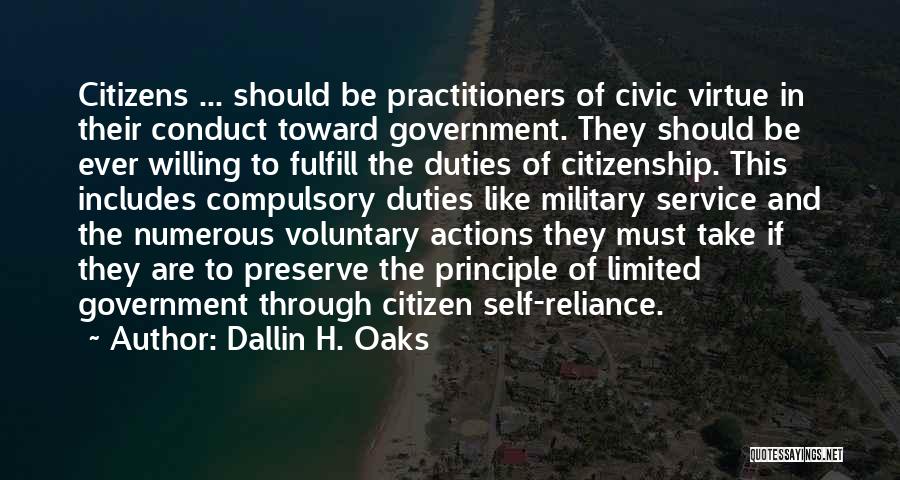
Citizens ... should be practitioners of civic virtue in their conduct toward government. They should be ever willing to fulfill the duties of citizenship. This includes compulsory duties like military service and the numerous voluntary actions they must take if they are to preserve the principle of limited government through citizen self-reliance. — Dallin H. Oaks
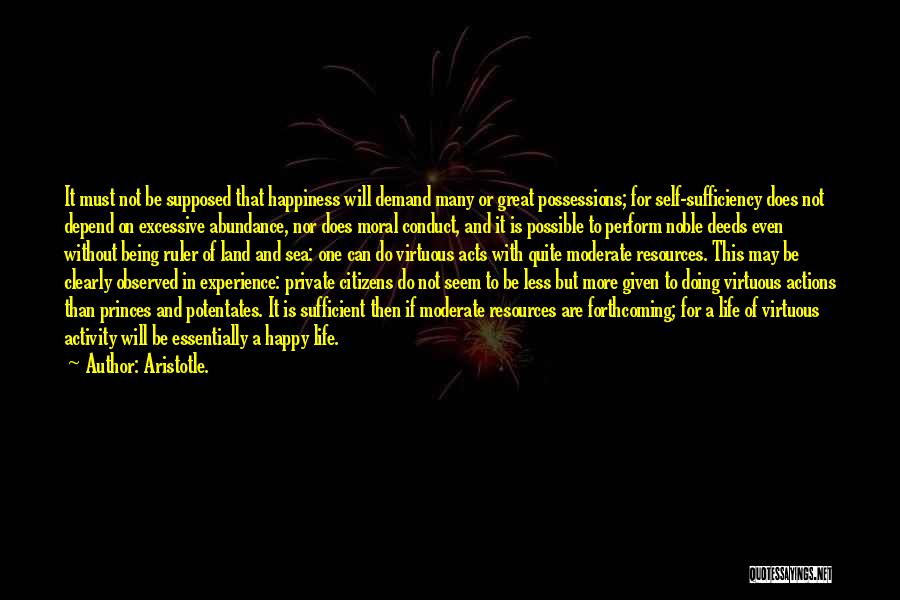
It must not be supposed that happiness will demand many or great possessions; for self-sufficiency does not depend on excessive abundance, nor does moral conduct, and it is possible to perform noble deeds even without being ruler of land and sea: one can do virtuous acts with quite moderate resources. This may be clearly observed in experience: private citizens do not seem to be less but more given to doing virtuous actions than princes and potentates. It is sufficient then if moderate resources are forthcoming; for a life of virtuous activity will be essentially a happy life. — Aristotle.
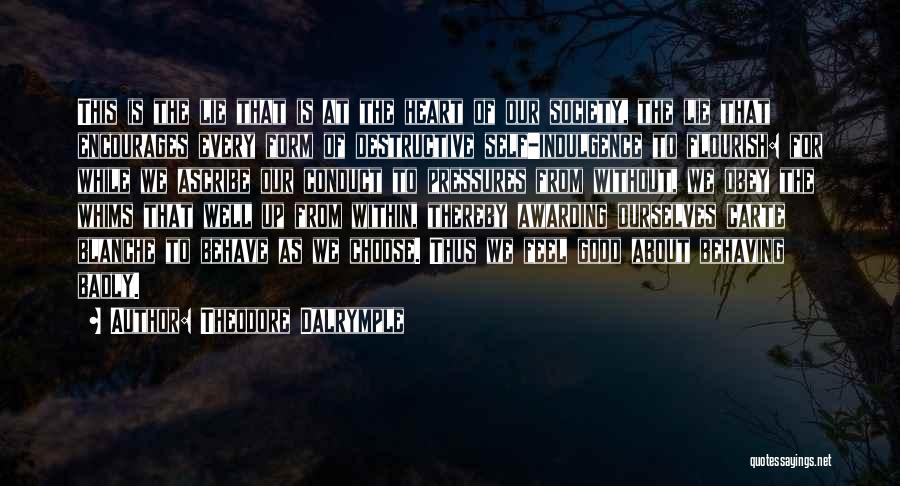
This is the lie that is at the heart of our society, the lie that encourages every form of destructive self-indulgence to flourish: for while we ascribe our conduct to pressures from without, we obey the whims that well up from within, thereby awarding ourselves carte blanche to behave as we choose. Thus we feel good about behaving badly. — Theodore Dalrymple

Your self-portait decides your conduct. — Mike Murdock
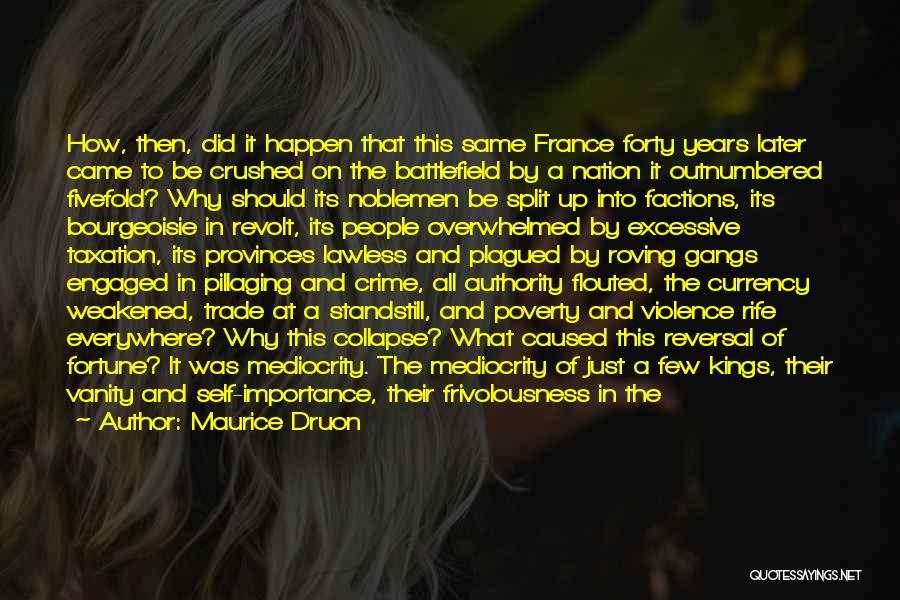
How, then, did it happen that this same France forty years later came to be crushed on the battlefield by a nation it outnumbered fivefold? Why should its noblemen be split up into factions, its bourgeoisie in revolt, its people overwhelmed by excessive taxation, its provinces lawless and plagued by roving gangs engaged in pillaging and crime, all authority flouted, the currency weakened, trade at a standstill, and poverty and violence rife everywhere? Why this collapse? What caused this reversal of fortune? It was mediocrity. The mediocrity of just a few kings, their vanity and self-importance, their frivolousness in the conduct of their affairs, their inability to attract talented advisors, their nonchalance, their presumptuousness, their failure to draw up grand designs or even to follow those already conceived. — Maurice Druon
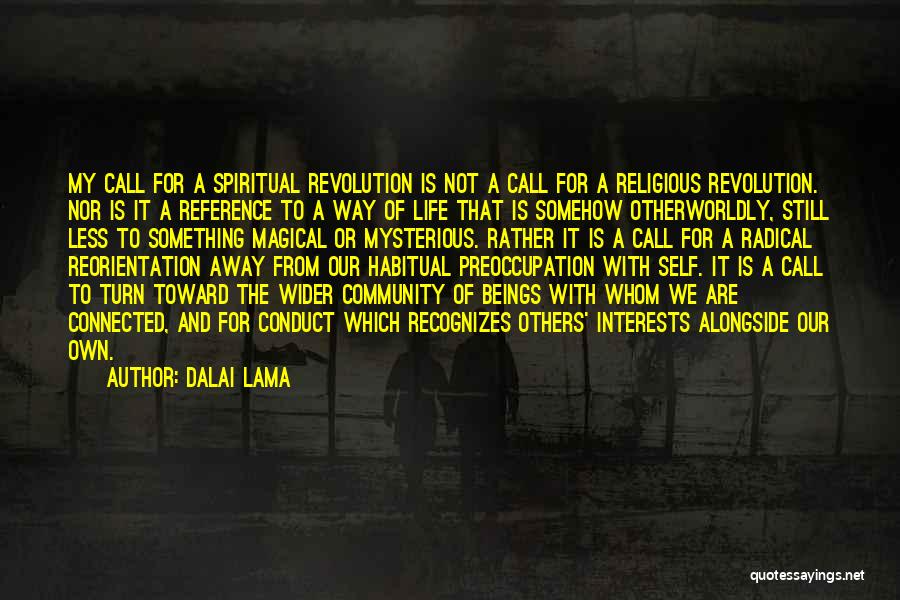
My call for a spiritual revolution is not a call for a religious revolution. Nor is it a reference to a way of life that is somehow otherworldly, still less to something magical or mysterious. Rather it is a call for a radical reorientation away from our habitual preoccupation with self. It is a call to turn toward the wider community of beings with whom we are connected, and for conduct which recognizes others' interests alongside our own. — Dalai Lama

Every man has within him only one life and one nature ... It behooves a man to look within himself and turn to the best dedication possible those endowments he has from his Maker. You do no wrong in questioning what once you held to be right for you, if now it has come to seem wrong. Put away all thought of being bound. We do not want you bound. No one who is not free can give freely. — Ellis Peters
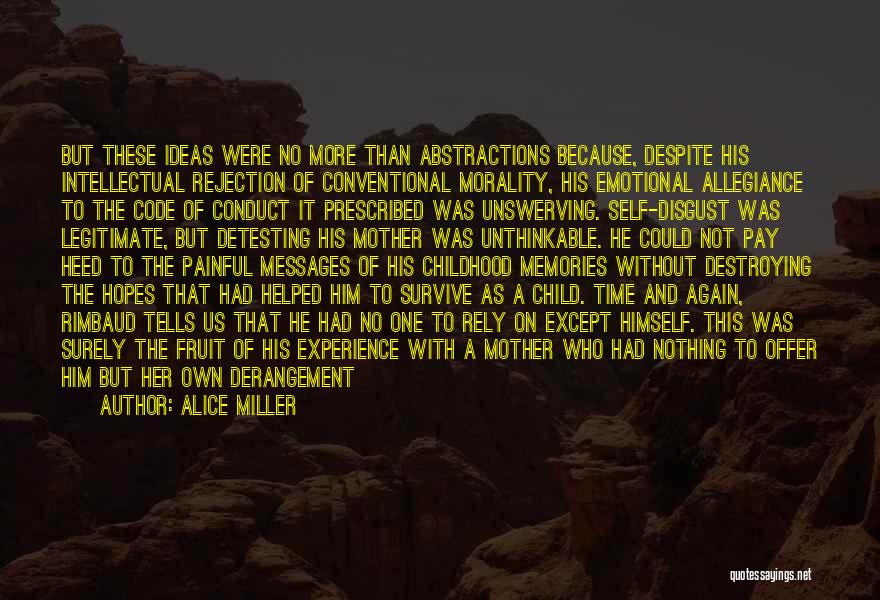
But these ideas were no more than abstractions because, despite his intellectual rejection of conventional morality, his emotional allegiance to the code of conduct it prescribed was unswerving. Self-disgust was legitimate, but detesting his mother was unthinkable. He could not pay heed to the painful messages of his childhood memories without destroying the hopes that had helped him to survive as a child. Time and again, Rimbaud tells us that he had no one to rely on except himself. This was surely the fruit of his experience with a mother who had nothing to offer him but her own derangement and hypocrisy, rather than true love. His entire life was a magnificent but vain attempt to save himself from destruction at the hands of his mother, with all the means at his disposal. Young people who have gone through much the same kind of childhood as Rimbaud are often fascinated by his poetry because they can vaguely sense the presence of a kindred spirit in it. Rimbaud — Alice Miller
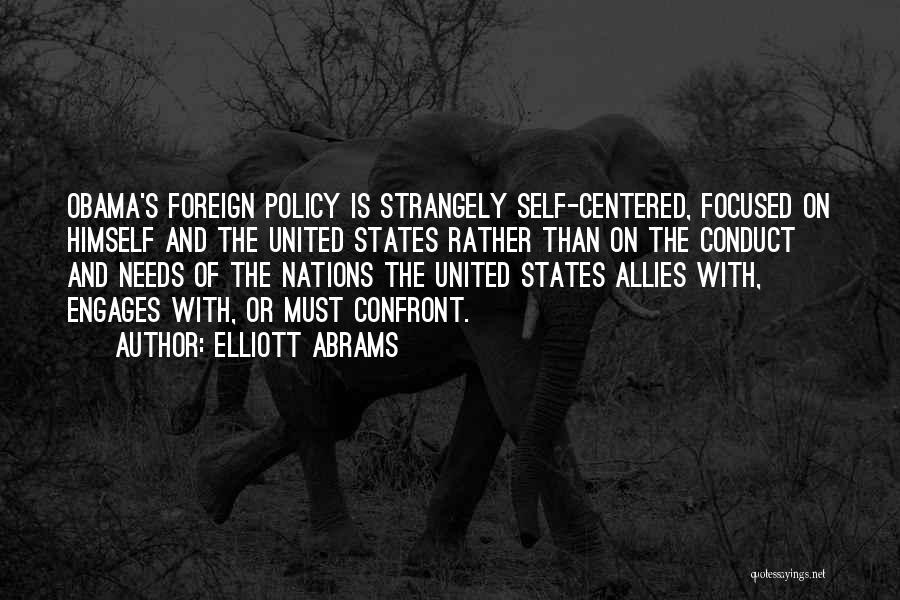
Obama's foreign policy is strangely self-centered, focused on himself and the United States rather than on the conduct and needs of the nations the United States allies with, engages with, or must confront. — Elliott Abrams
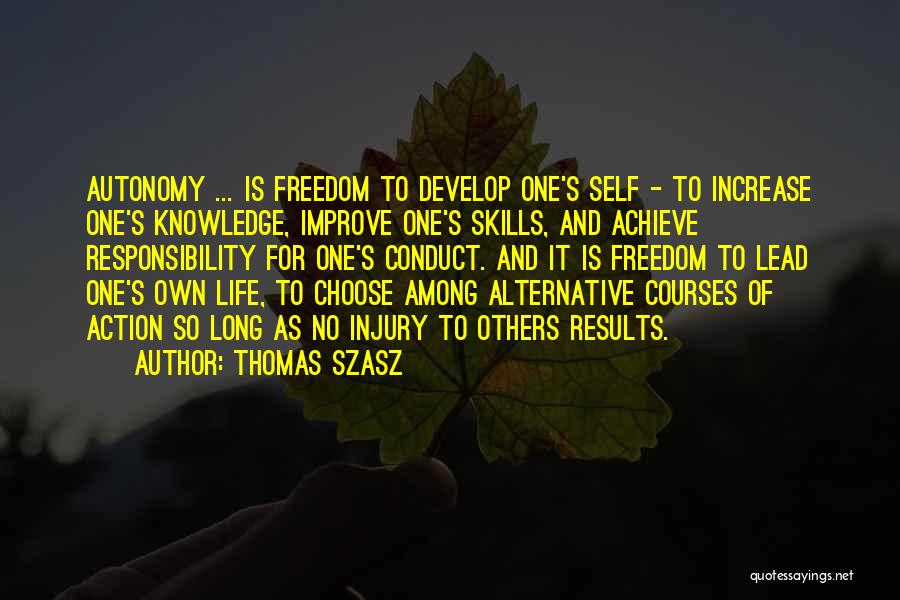
Autonomy ... is freedom to develop one's self - to increase one's knowledge, improve one's skills, and achieve responsibility for one's conduct. And it is freedom to lead one's own life, to choose among alternative courses of action so long as no injury to others results. — Thomas Szasz
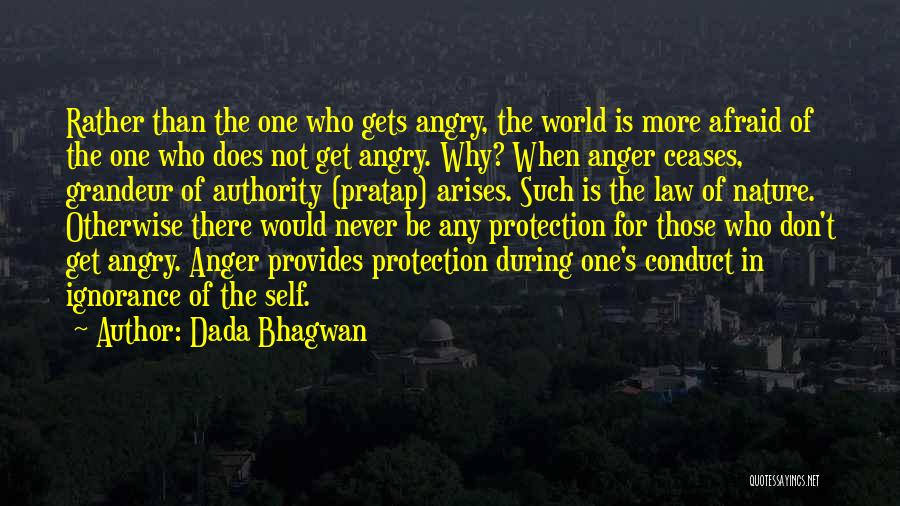
Rather than the one who gets angry, the world is more afraid of the one who does not get angry. Why? When anger ceases, grandeur of authority (pratap) arises. Such is the law of nature. Otherwise there would never be any protection for those who don't get angry. Anger provides protection during one's conduct in ignorance of the self. — Dada Bhagwan
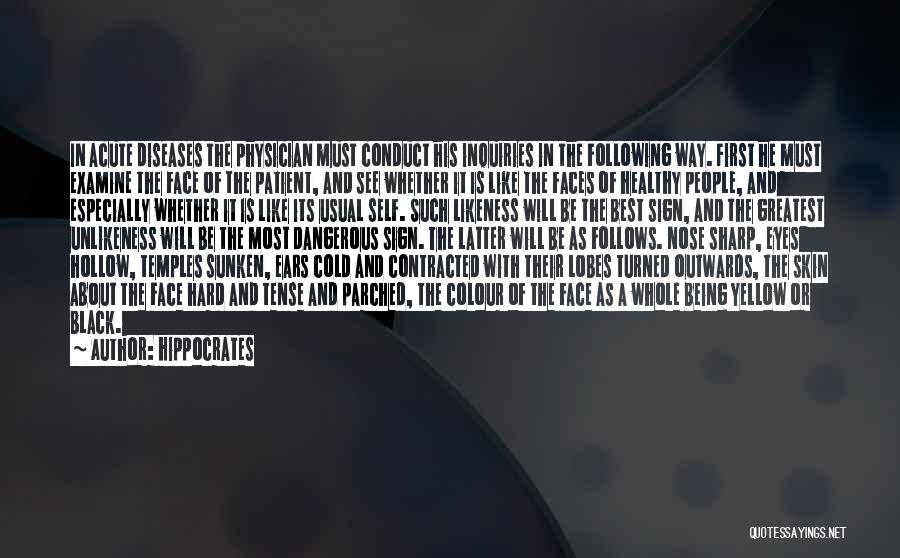
In acute diseases the physician must conduct his inquiries in the following way. First he must examine the face of the patient, and see whether it is like the faces of healthy people, and especially whether it is like its usual self. Such likeness will be the best sign, and the greatest unlikeness will be the most dangerous sign. The latter will be as follows. Nose sharp, eyes hollow, temples sunken, ears cold and contracted with their lobes turned outwards, the skin about the face hard and tense and parched, the colour of the face as a whole being yellow or black. — Hippocrates

To summarize, then, it appears that Christian holiness is a number of things together. It has both outward and inward aspects. Holiness is a matter of both action and motivation, conduct and character, divine grace and human effort, obedience and creativity, submission and initiative, consecration to God and commitment to people, self-discipline and self-giving, righteousness and love. It is a matter of Spirit-led law-keeping, a walk, or course of life, in the Spirit that displays the fruit of the Spirit (Christlikeness of attitude and disposition). It is a matter of seeking to imitate Jesus' way of behaving, through depending on Jesus for deliverance from carnal self-absorption and for discernment of spiritual needs and possibilities. — J.I. Packer
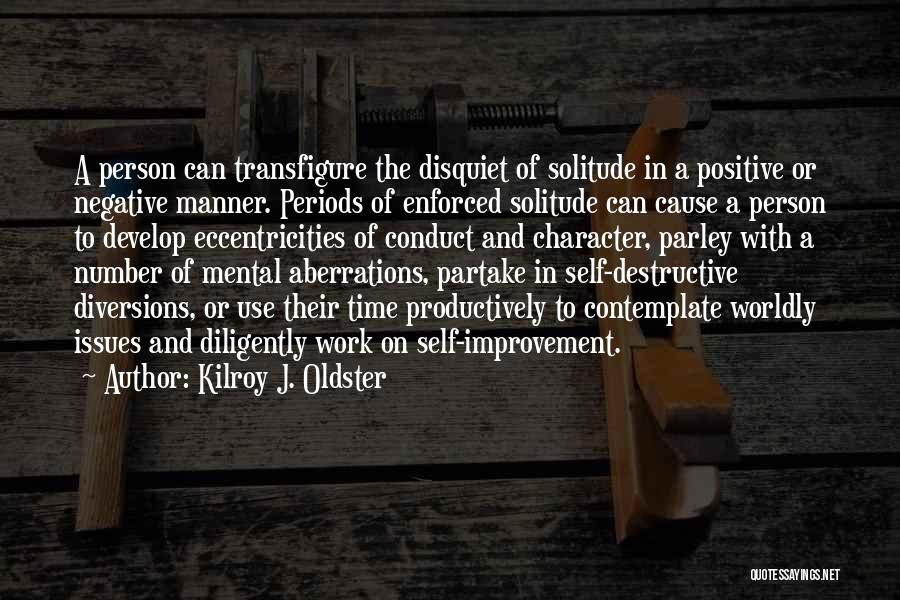
A person can transfigure the disquiet of solitude in a positive or negative manner. Periods of enforced solitude can cause a person to develop eccentricities of conduct and character, parley with a number of mental aberrations, partake in self-destructive diversions, or use their time productively to contemplate worldly issues and diligently work on self-improvement. — Kilroy J. Oldster
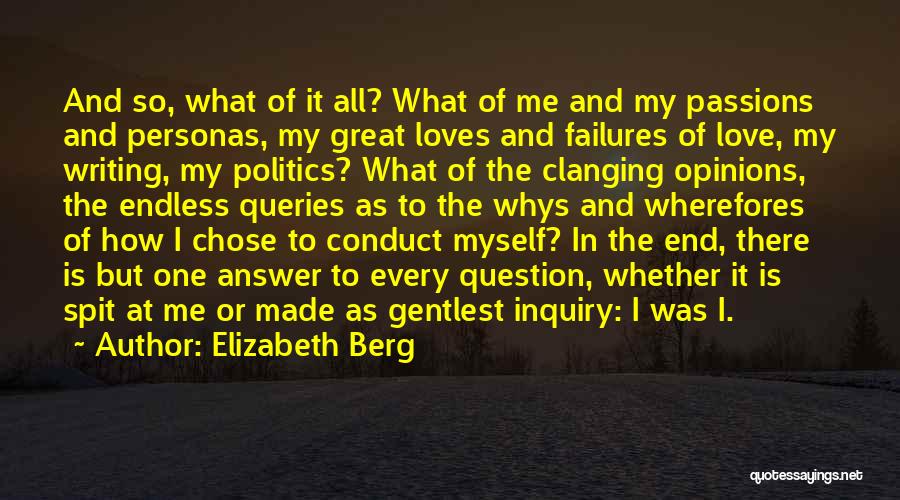
And so, what of it all? What of me and my passions and personas, my great loves and failures of love, my writing, my politics? What of the clanging opinions, the endless queries as to the whys and wherefores of how I chose to conduct myself? In the end, there is but one answer to every question, whether it is spit at me or made as gentlest inquiry: I was I. — Elizabeth Berg
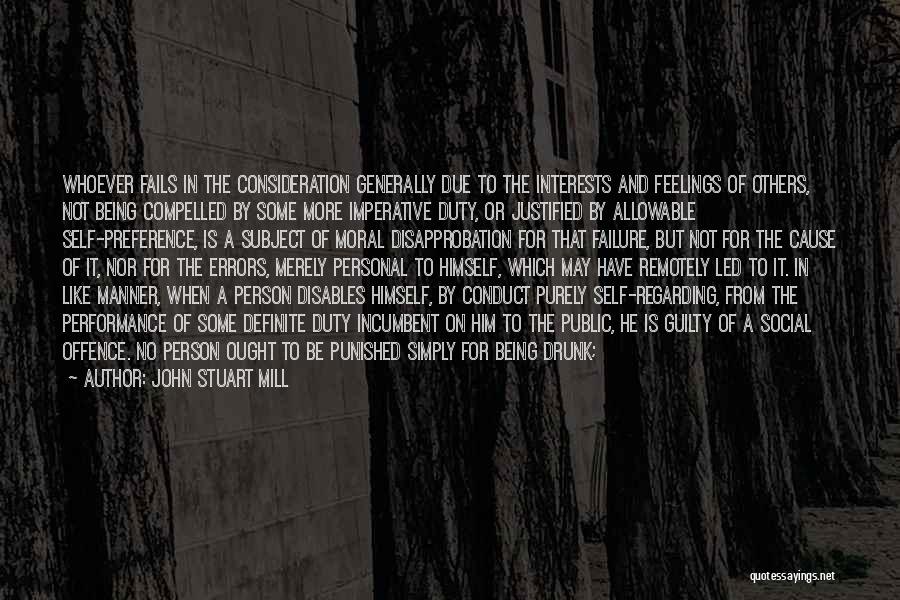
Whoever fails in the consideration generally due to the interests and feelings of others, not being compelled by some more imperative duty, or justified by allowable self-preference, is a subject of moral disapprobation for that failure, but not for the cause of it, nor for the errors, merely personal to himself, which may have remotely led to it. In like manner, when a person disables himself, by conduct purely self-regarding, from the performance of some definite duty incumbent on him to the public, he is guilty of a social offence. No person ought to be punished simply for being drunk; but a soldier or a policeman should be punished for being drunk on duty. — John Stuart Mill
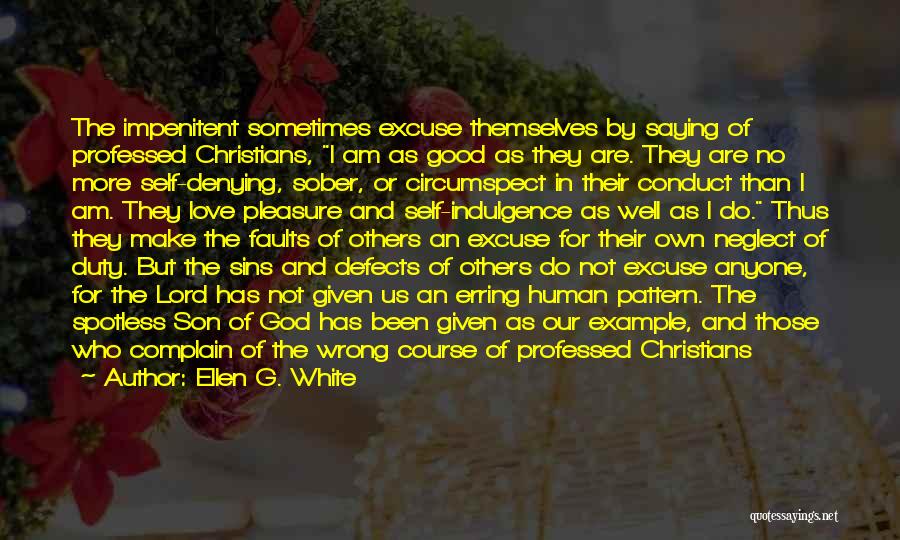
The impenitent sometimes excuse themselves by saying of professed Christians, "I am as good as they are. They are no more self-denying, sober, or circumspect in their conduct than I am. They love pleasure and self-indulgence as well as I do." Thus they make the faults of others an excuse for their own neglect of duty. But the sins and defects of others do not excuse anyone, for the Lord has not given us an erring human pattern. The spotless Son of God has been given as our example, and those who complain of the wrong course of professed Christians are the ones who should show better lives and nobler examples. If they have so high a conception of what a Christian should be, is not their own sin so much the greater? They know what is right, and yet refuse to do it. {SC 32.1} — Ellen G. White
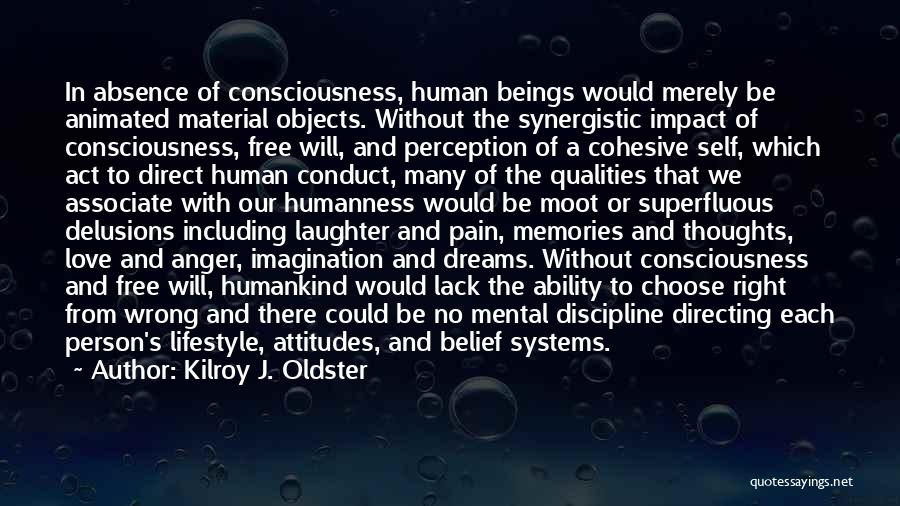
In absence of consciousness, human beings would merely be animated material objects. Without the synergistic impact of consciousness, free will, and perception of a cohesive self, which act to direct human conduct, many of the qualities that we associate with our humanness would be moot or superfluous delusions including laughter and pain, memories and thoughts, love and anger, imagination and dreams. Without consciousness and free will, humankind would lack the ability to choose right from wrong and there could be no mental discipline directing each person's lifestyle, attitudes, and belief systems. — Kilroy J. Oldster






